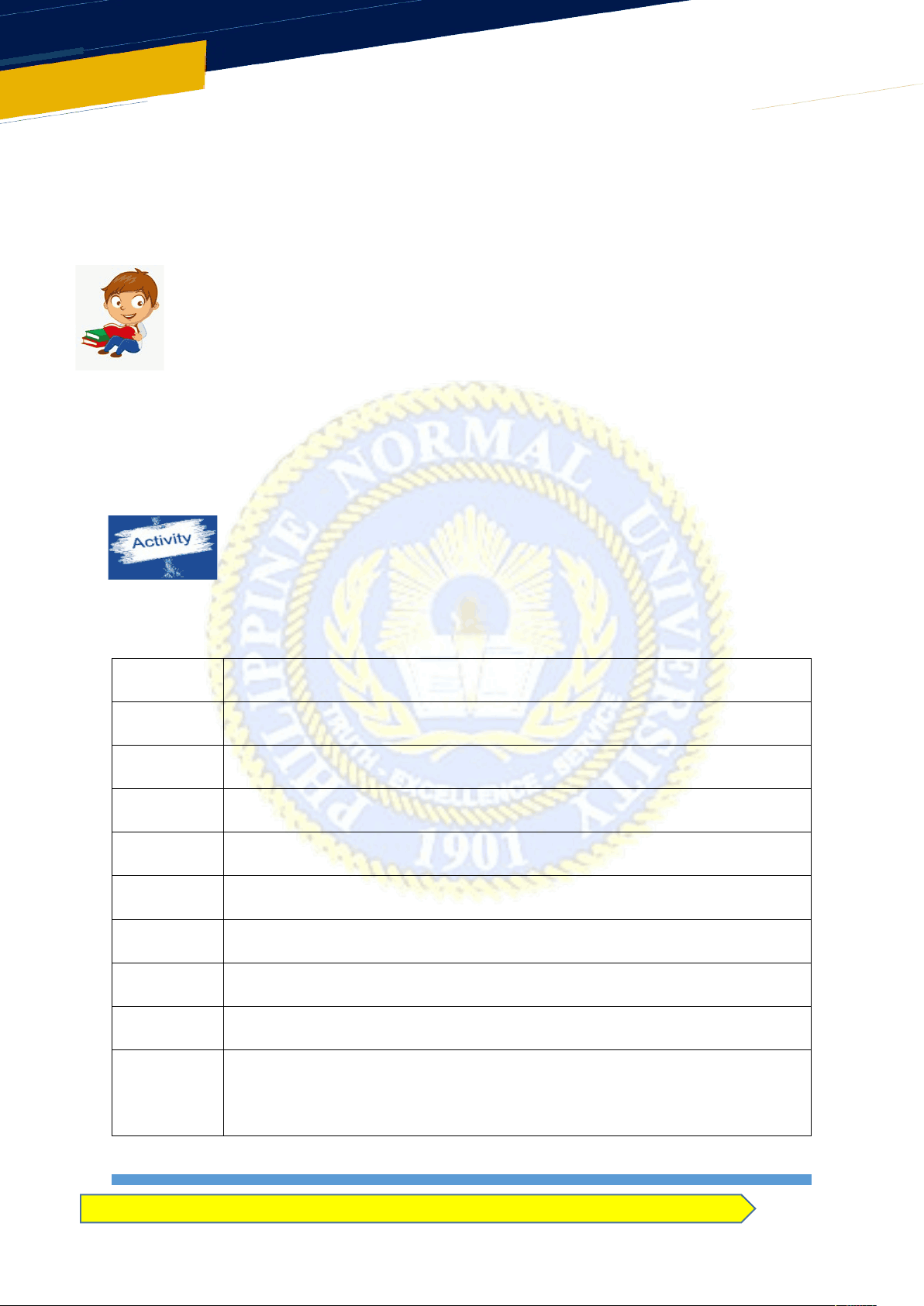
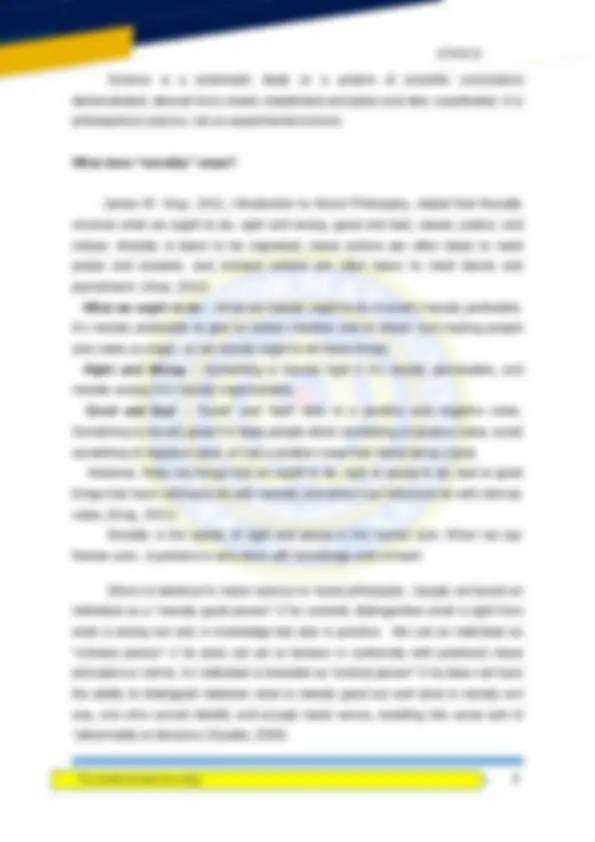
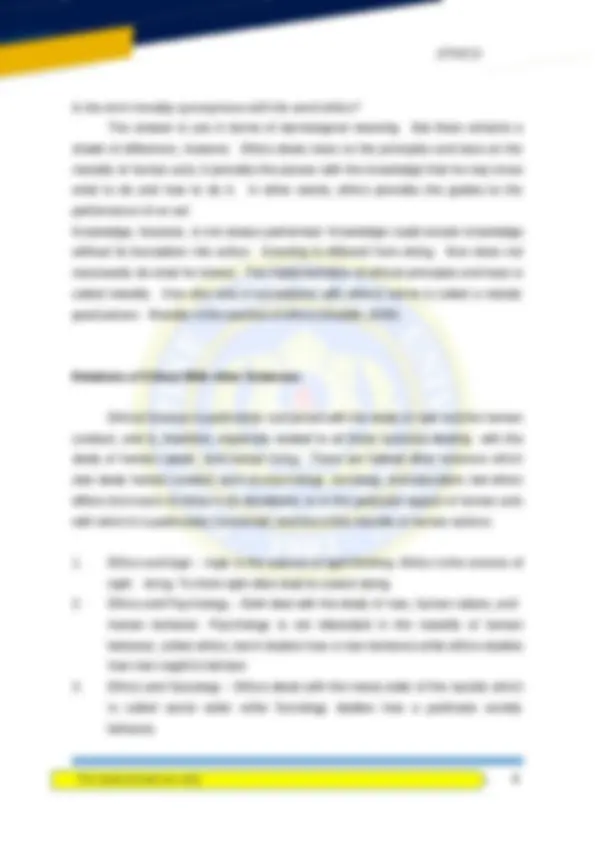
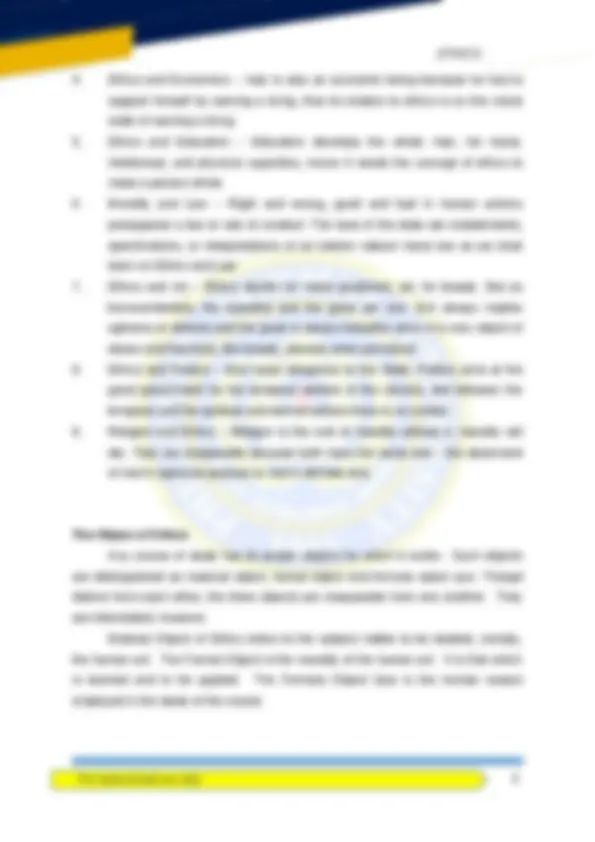
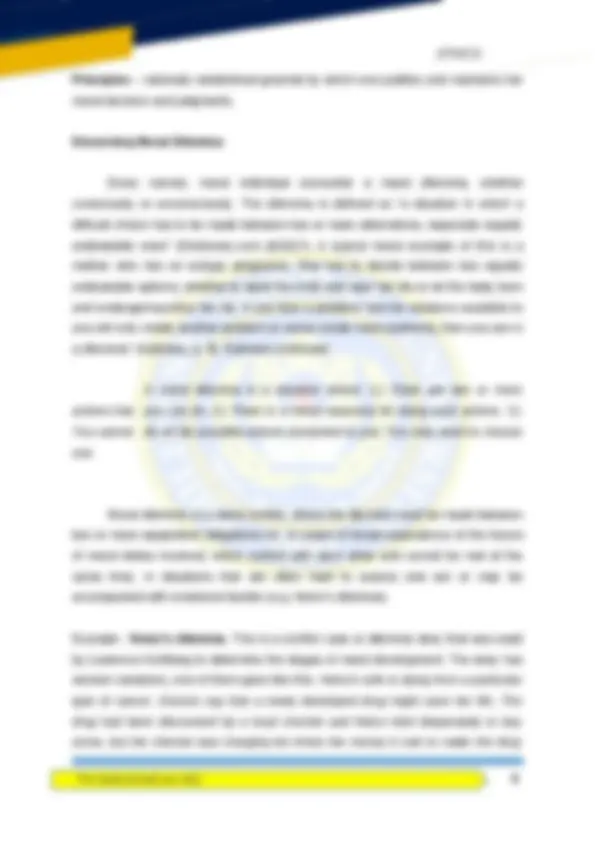
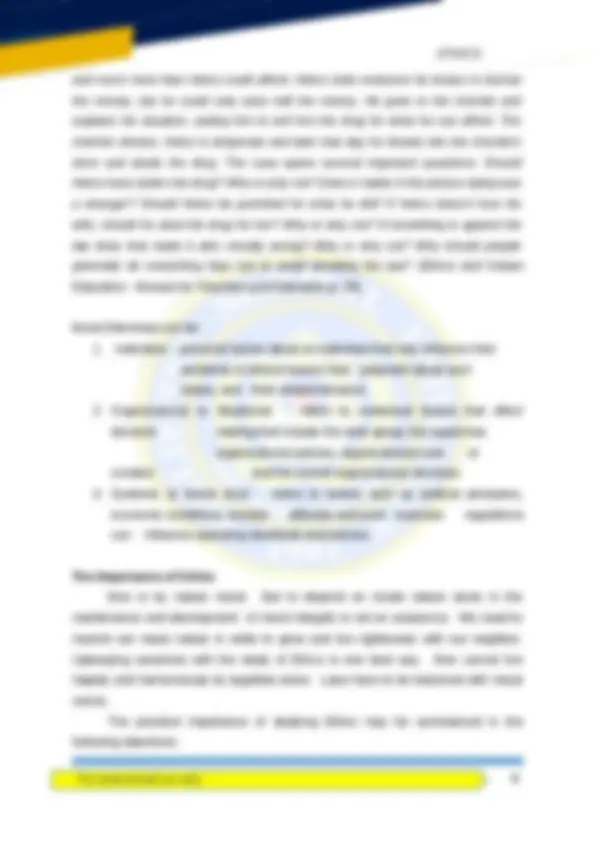
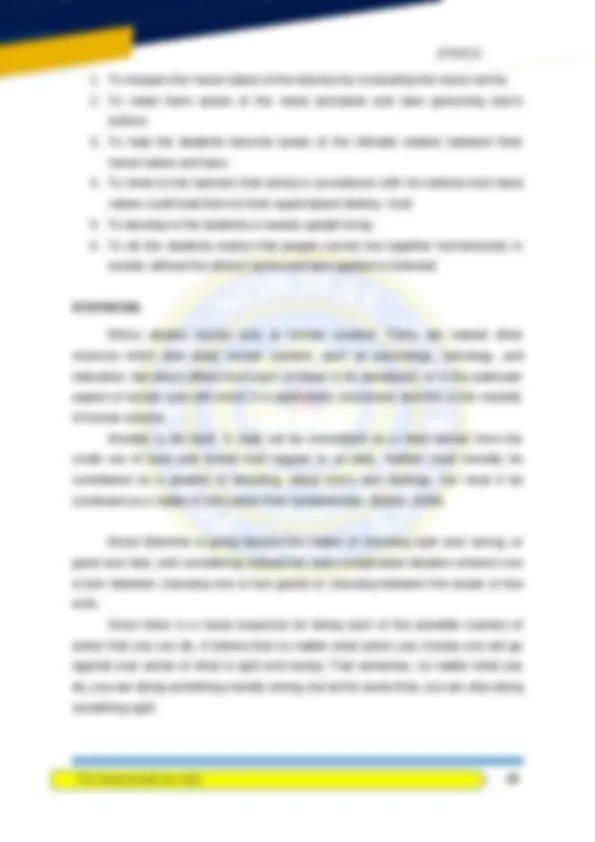
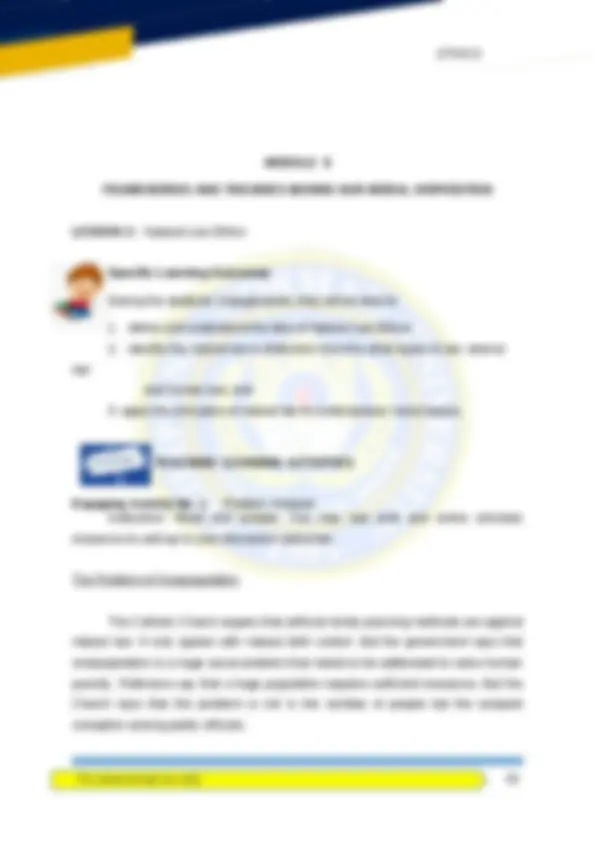
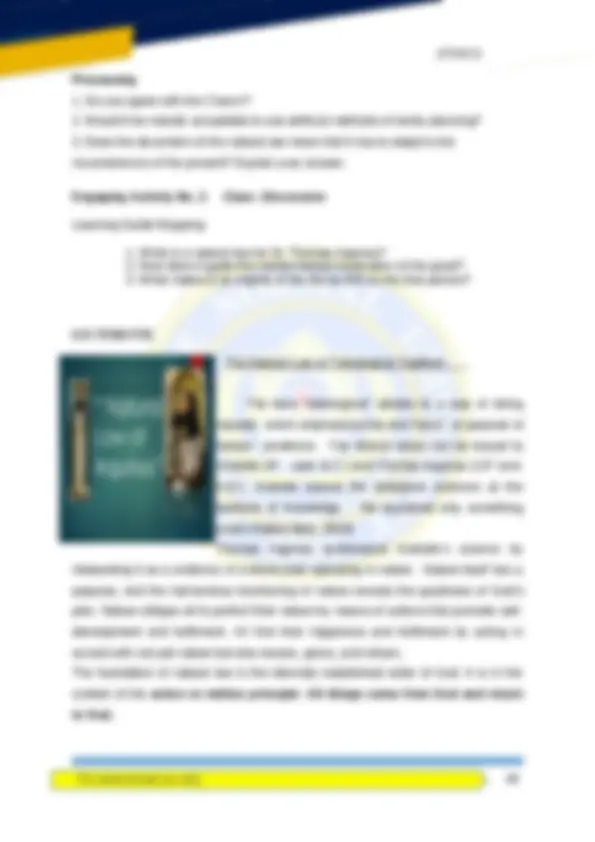
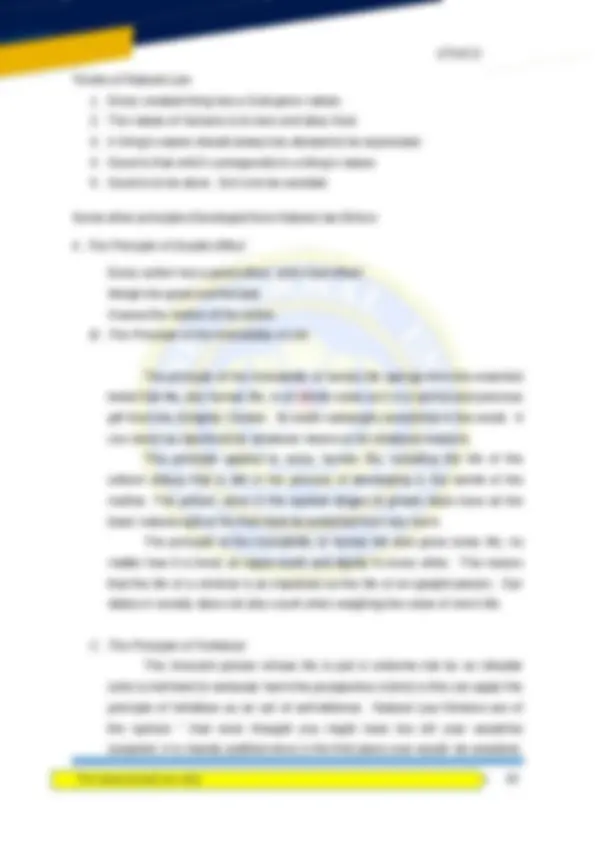
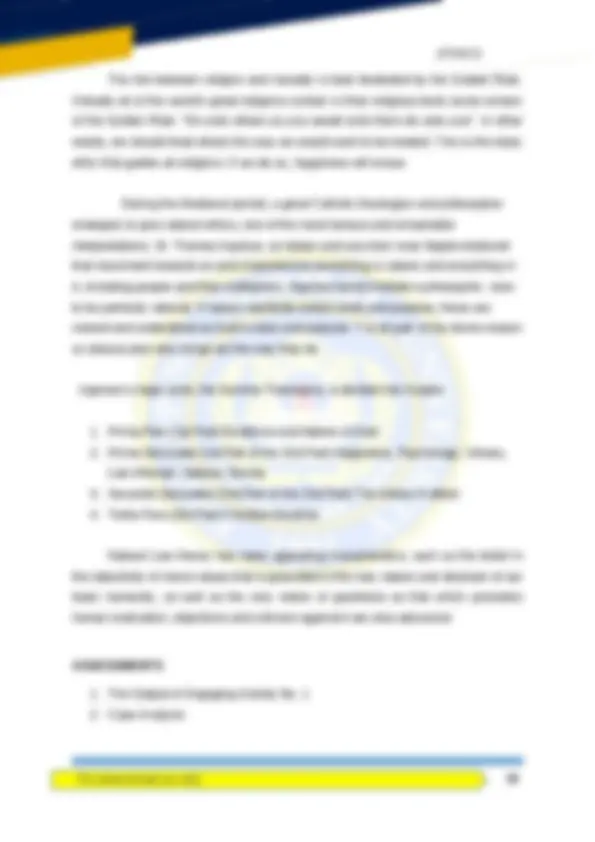
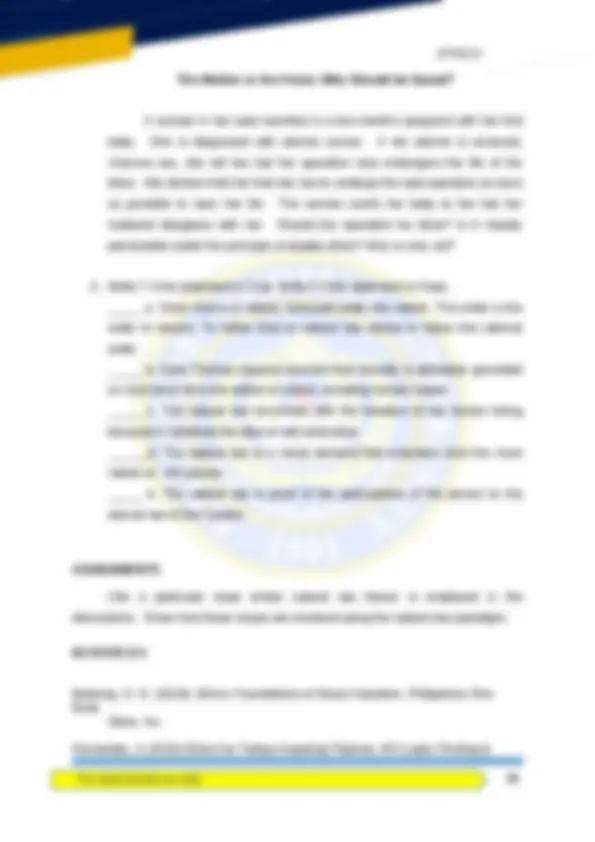
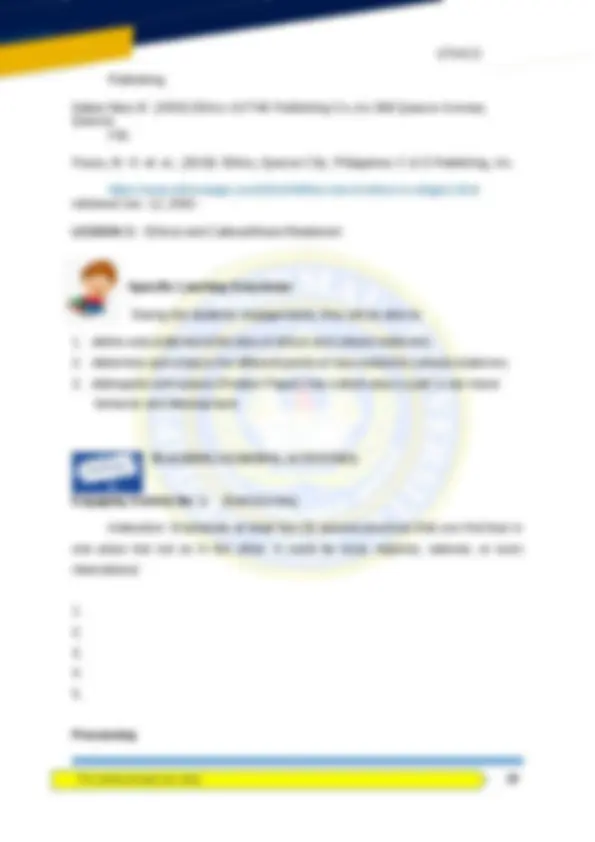
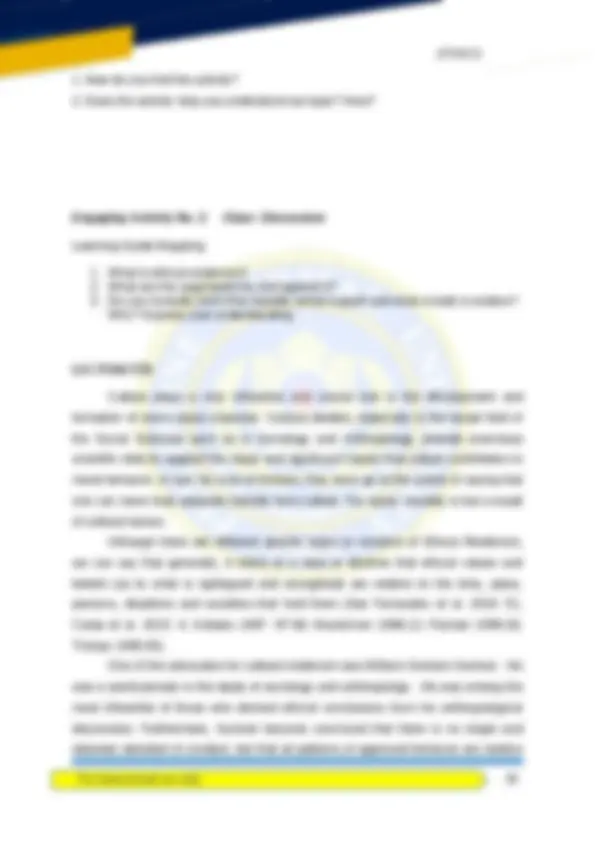
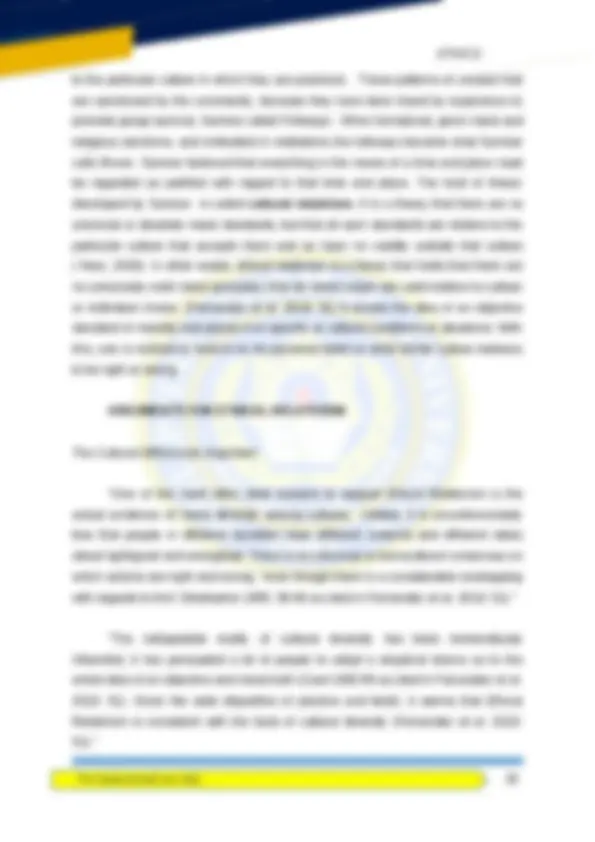
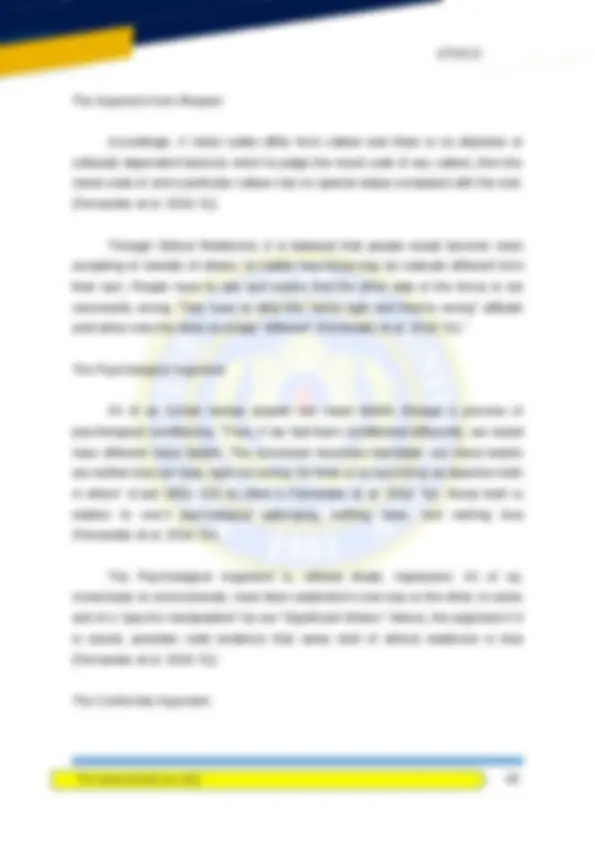
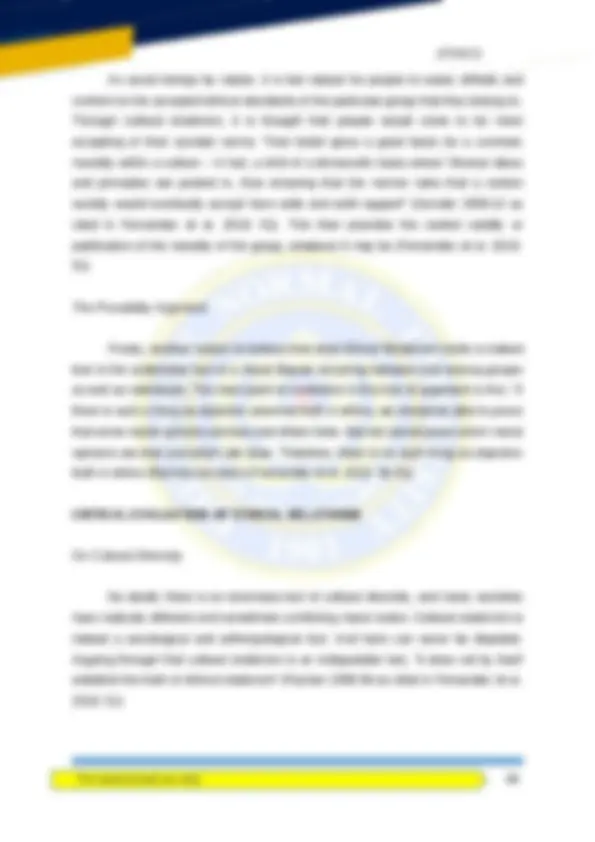
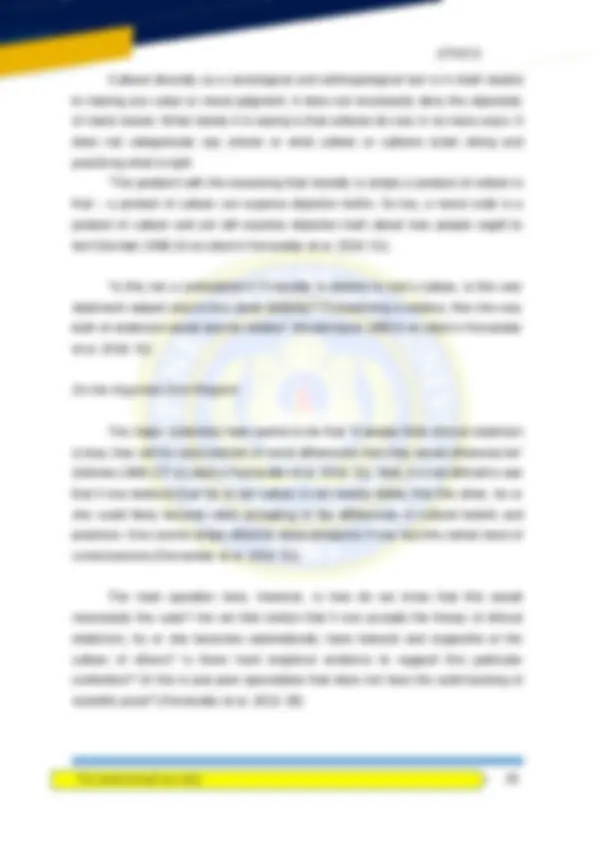
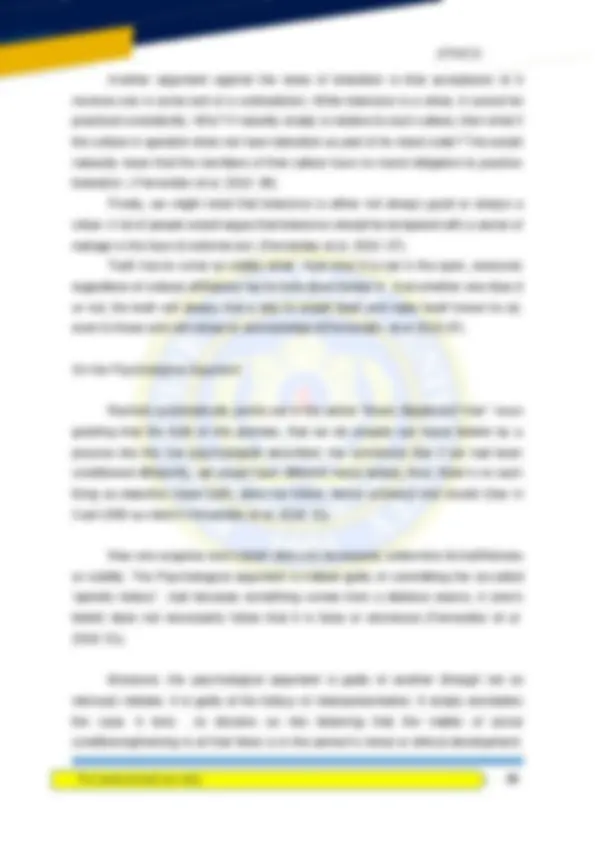
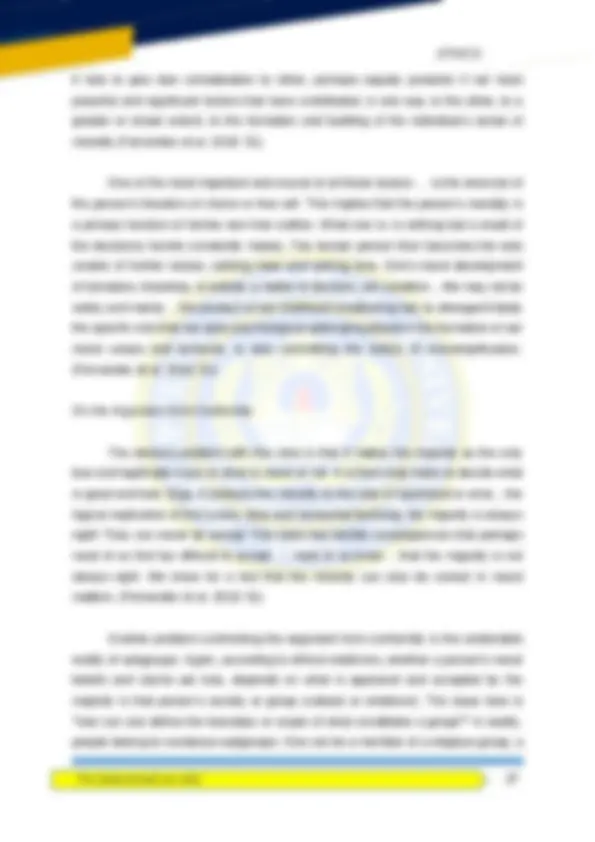
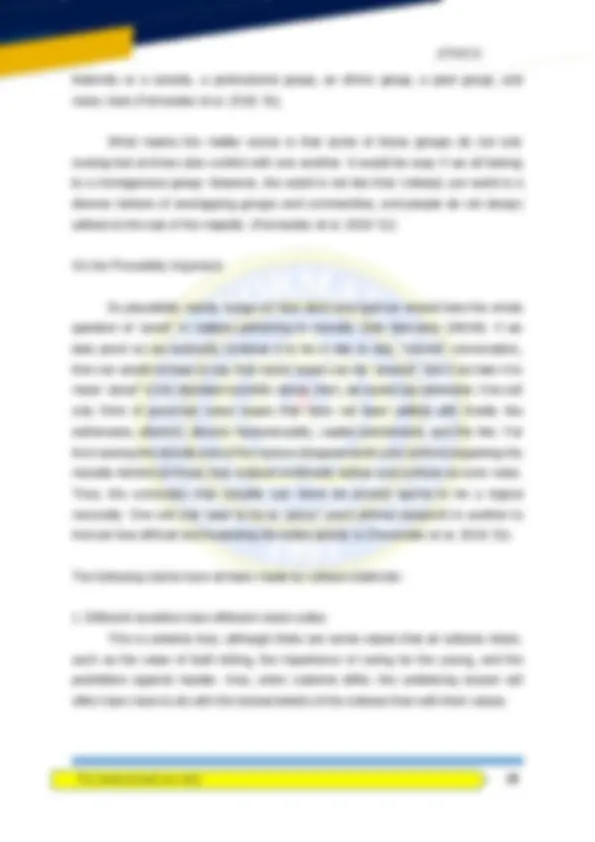
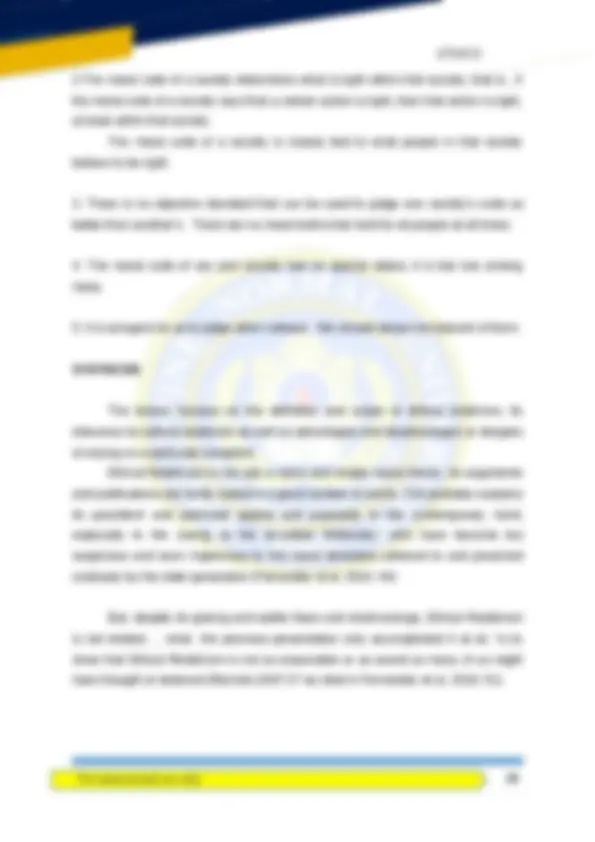
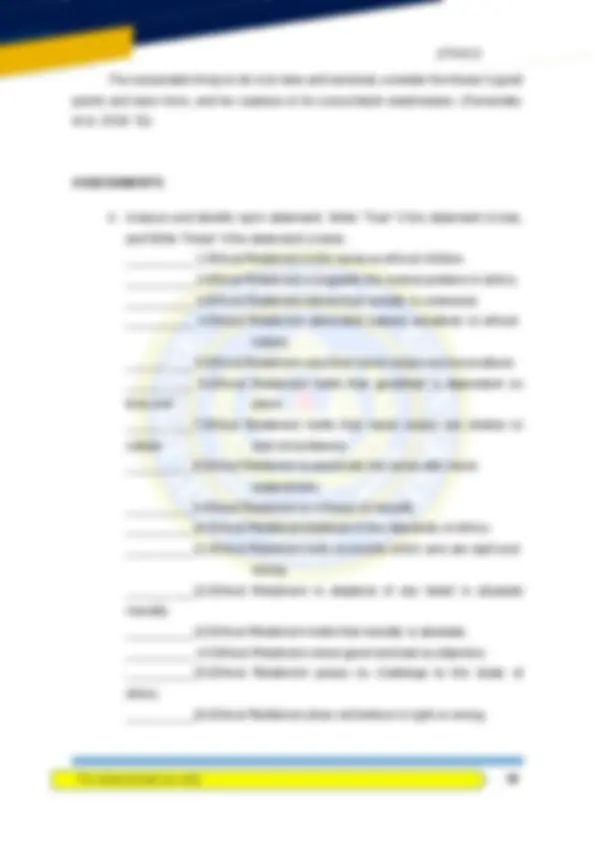
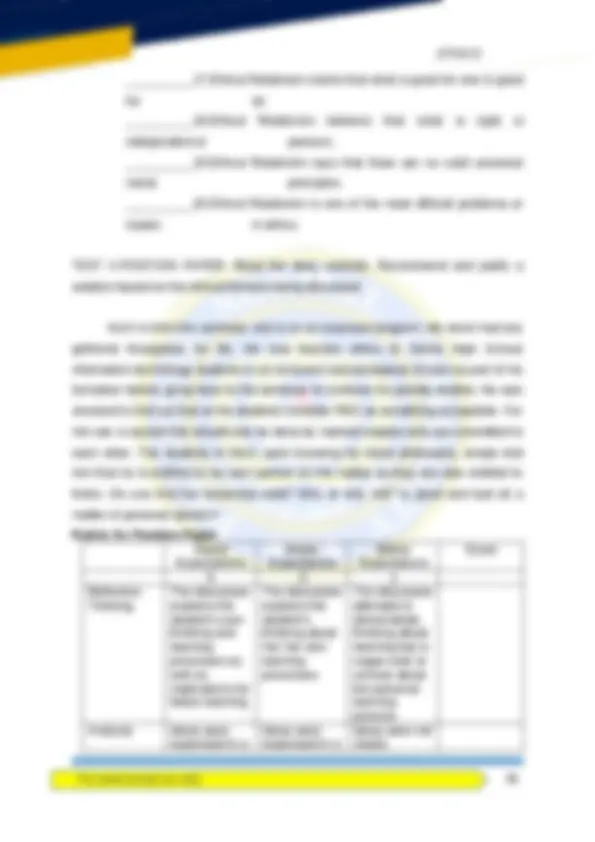
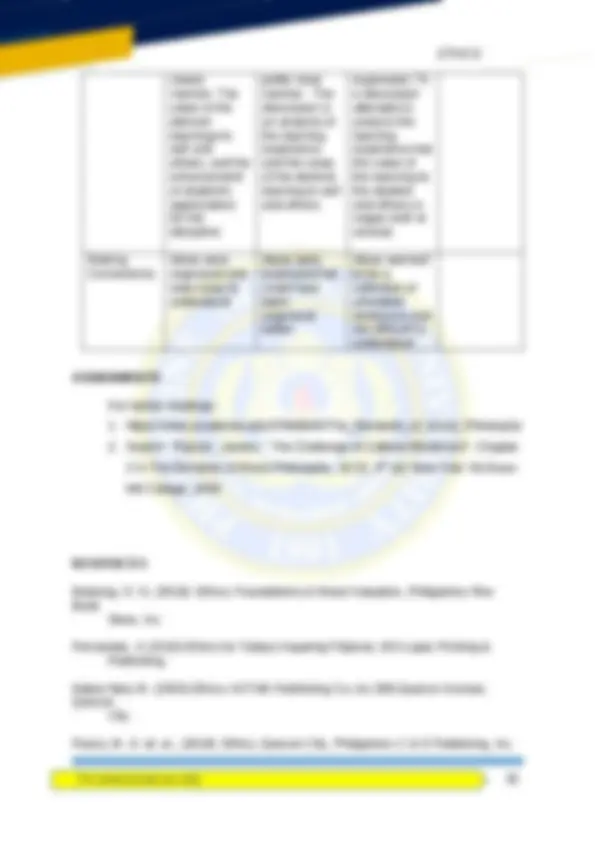
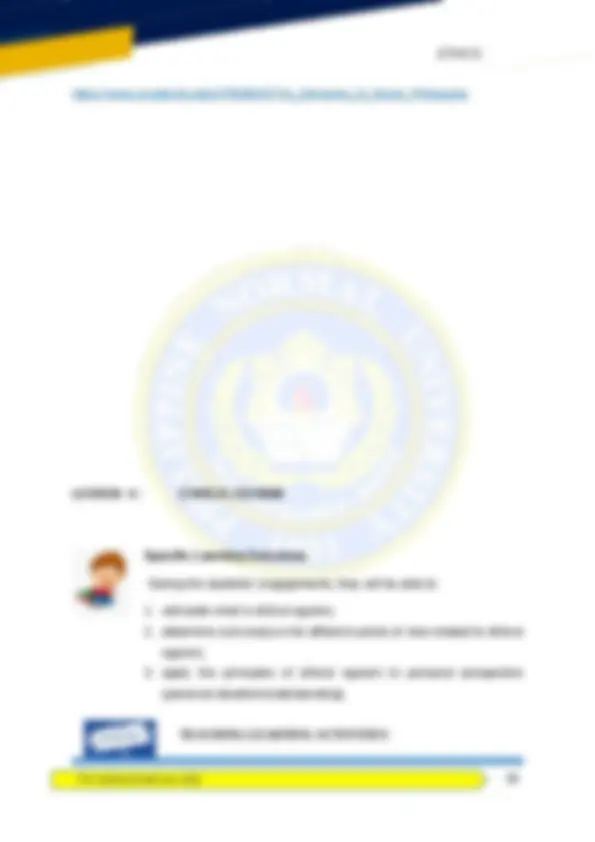
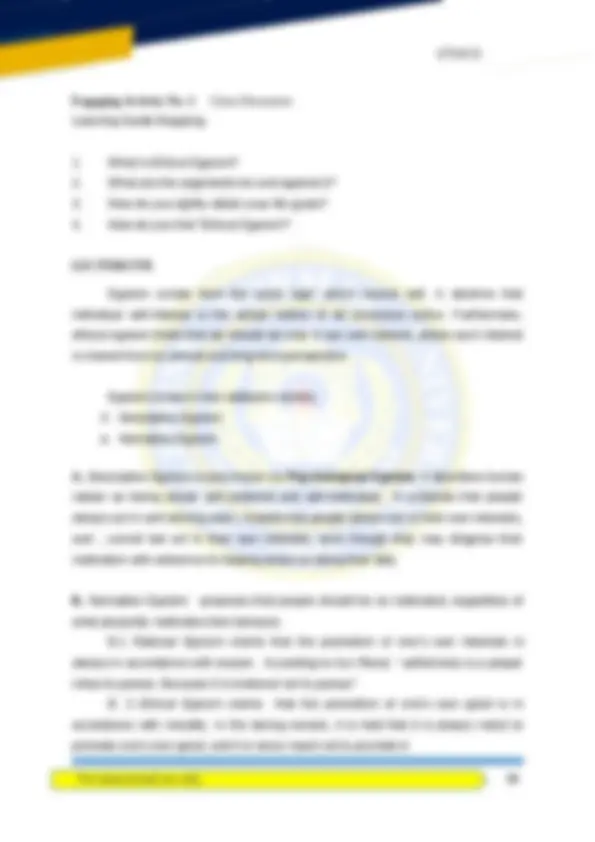
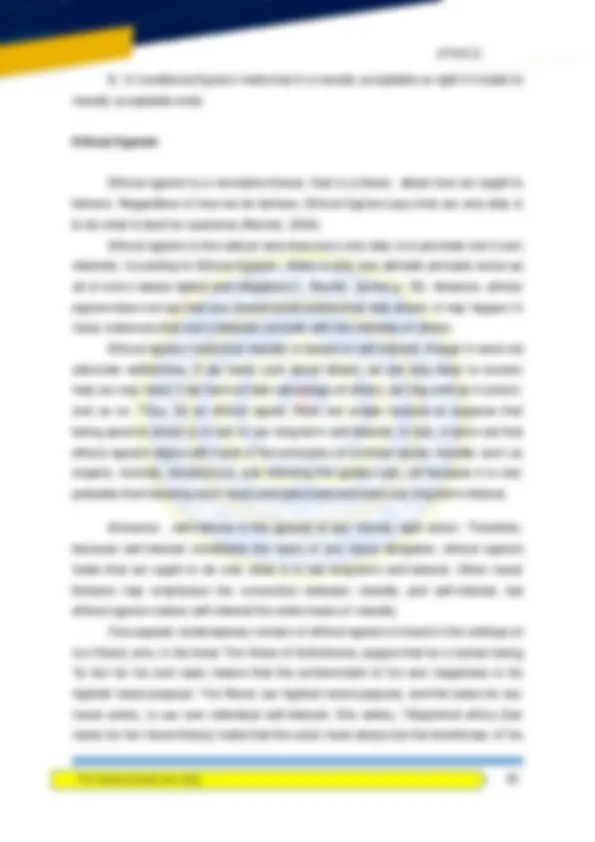
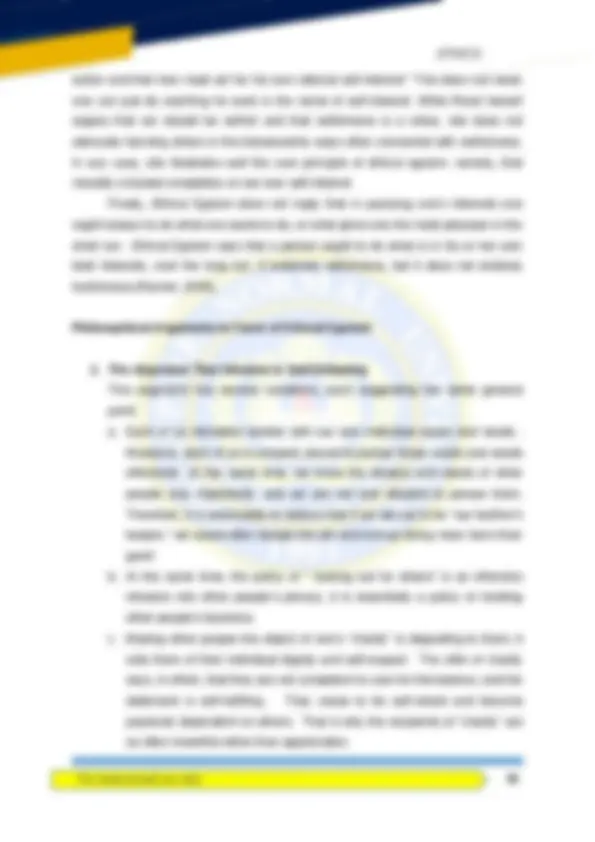
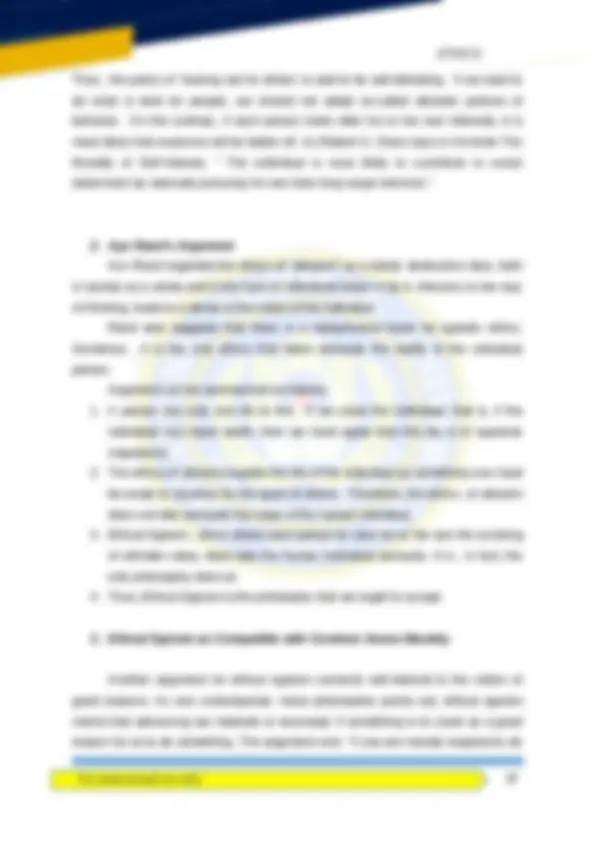
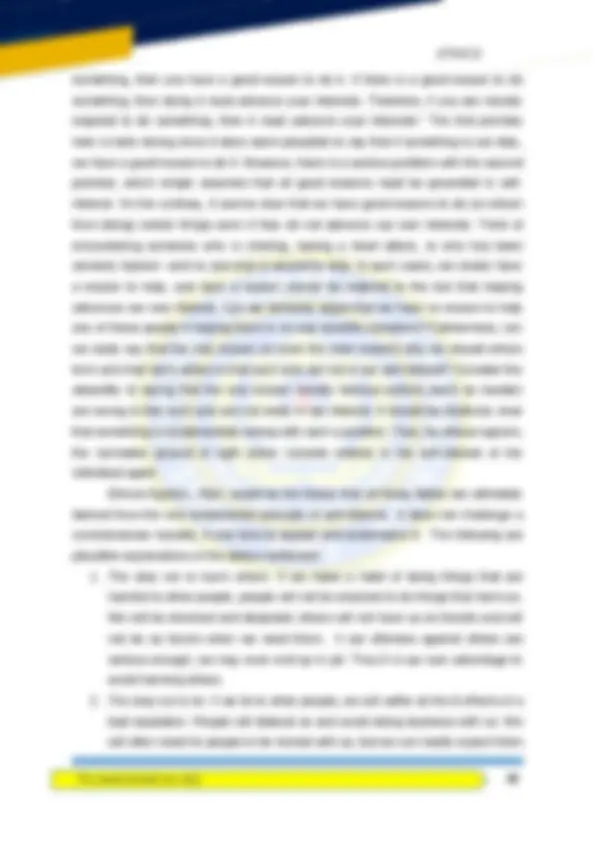
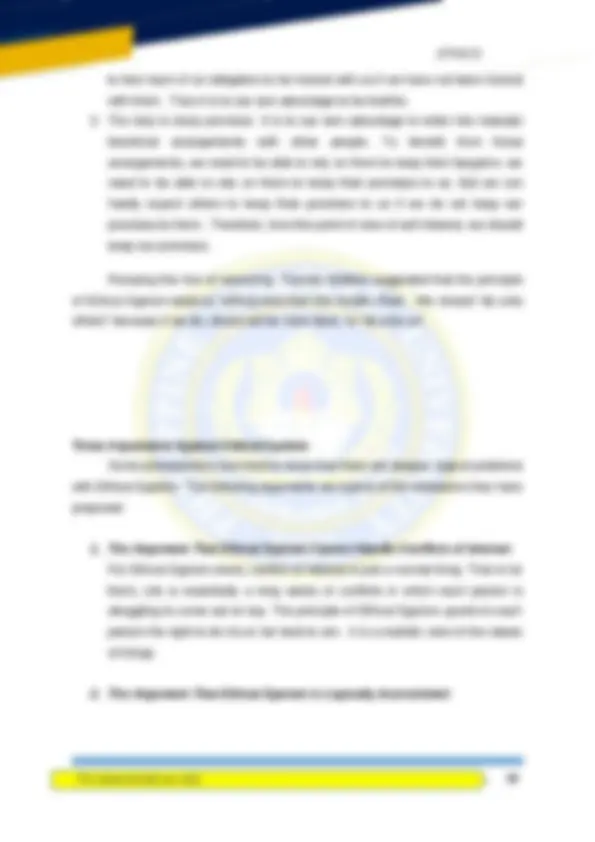
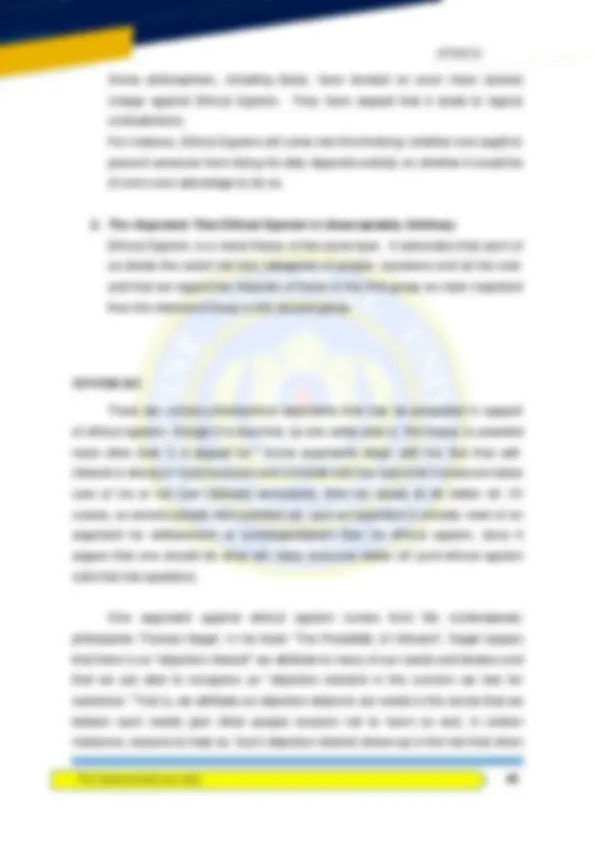
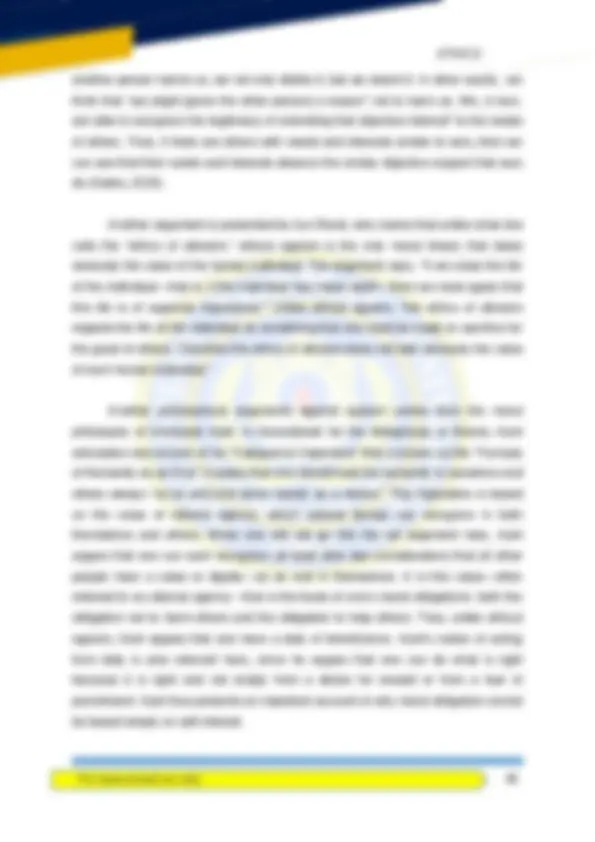
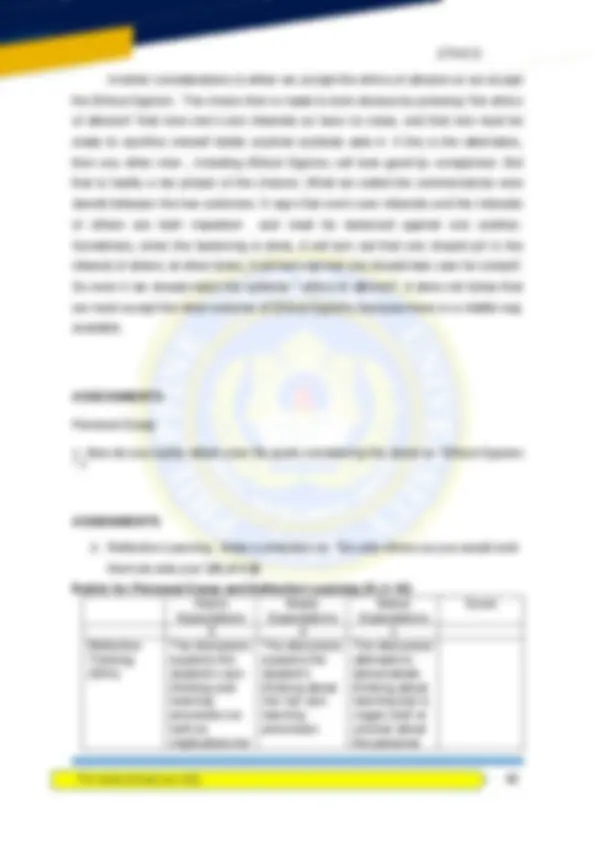
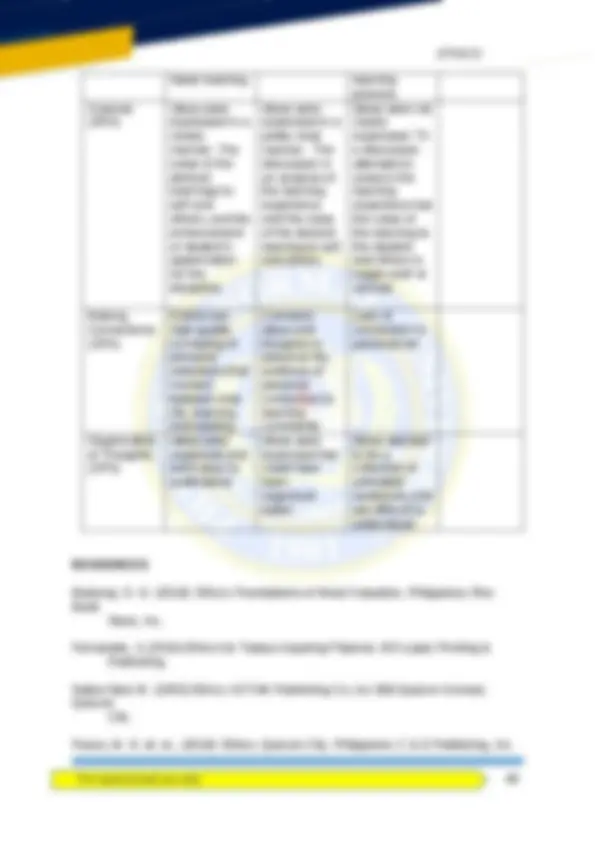
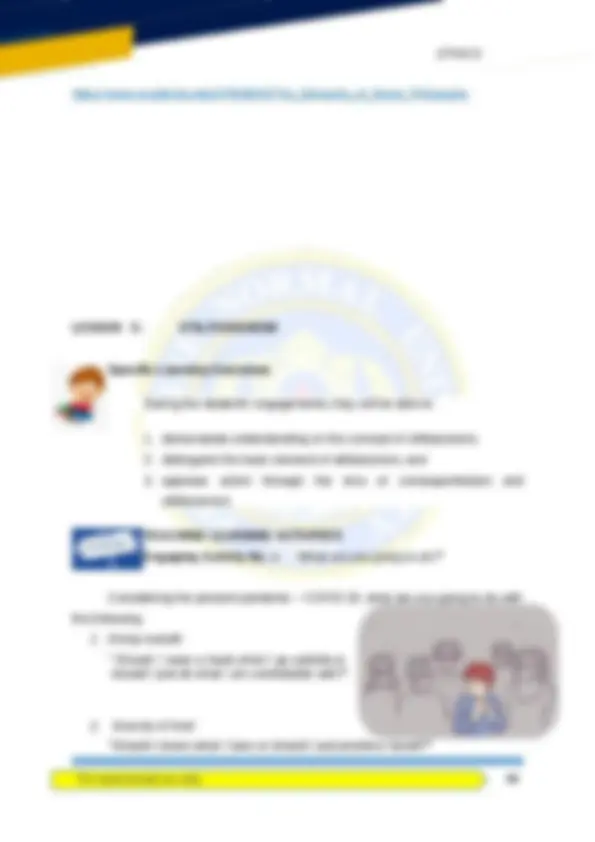
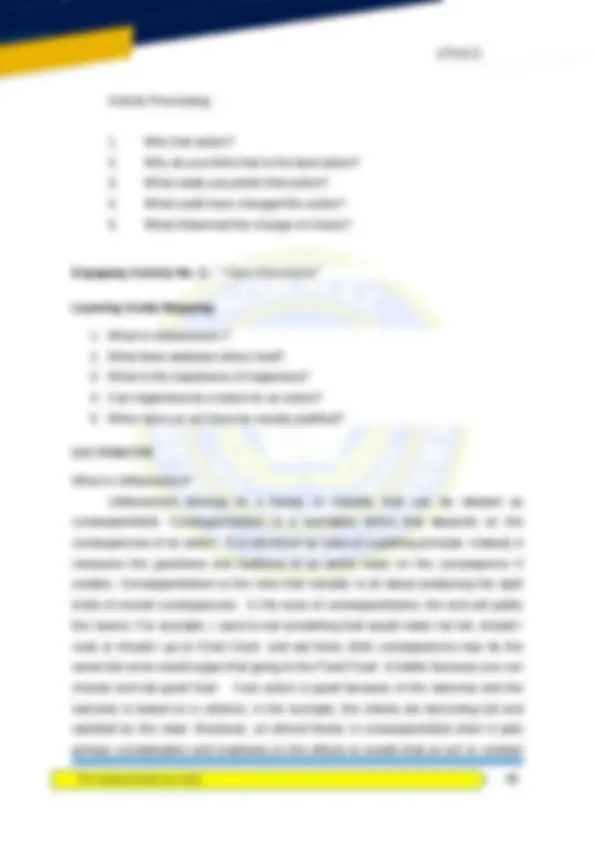
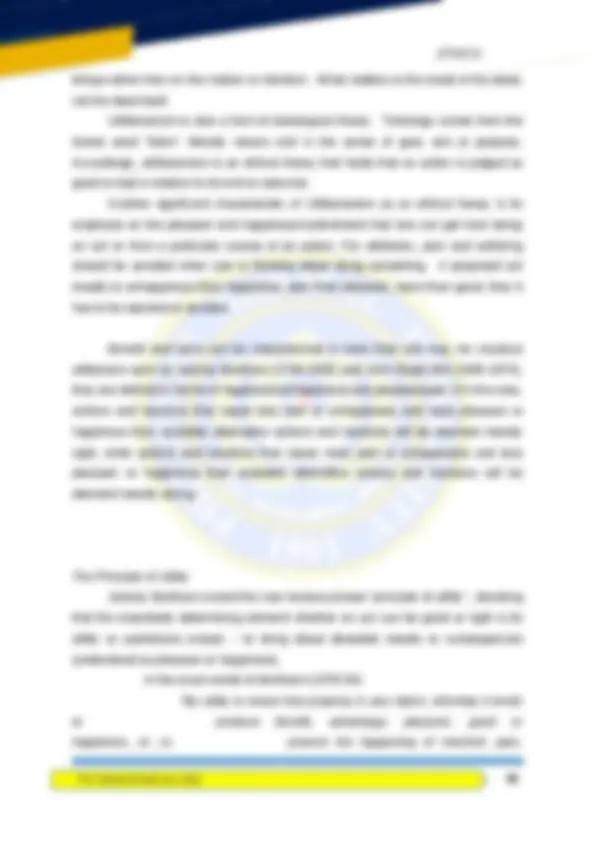
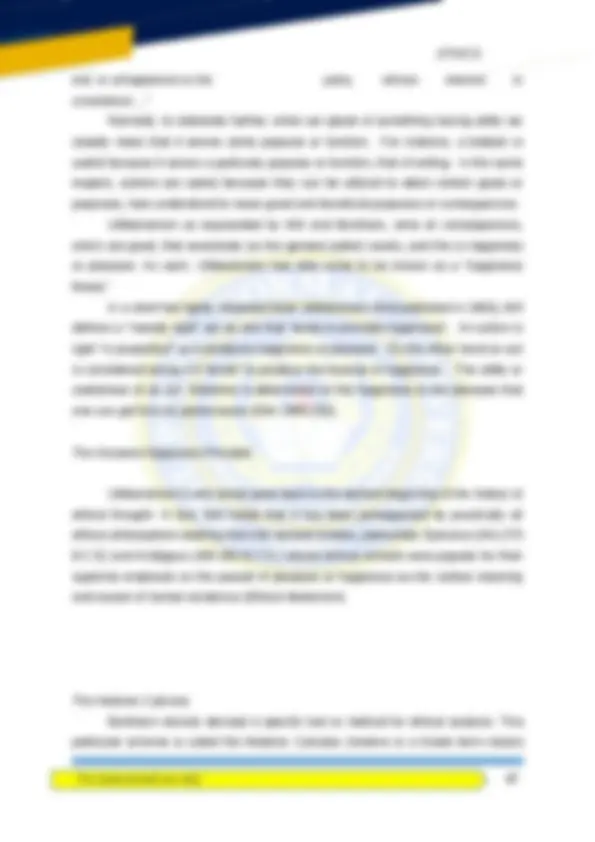
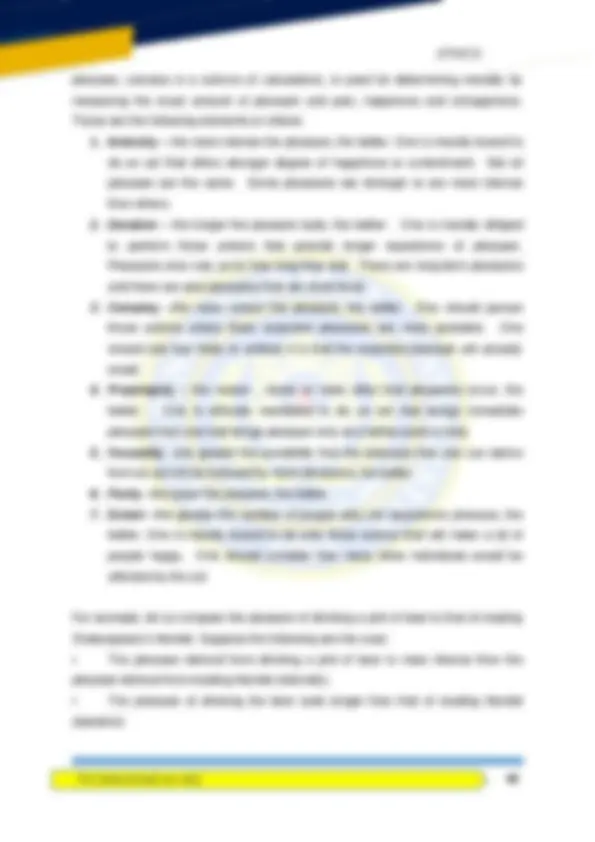
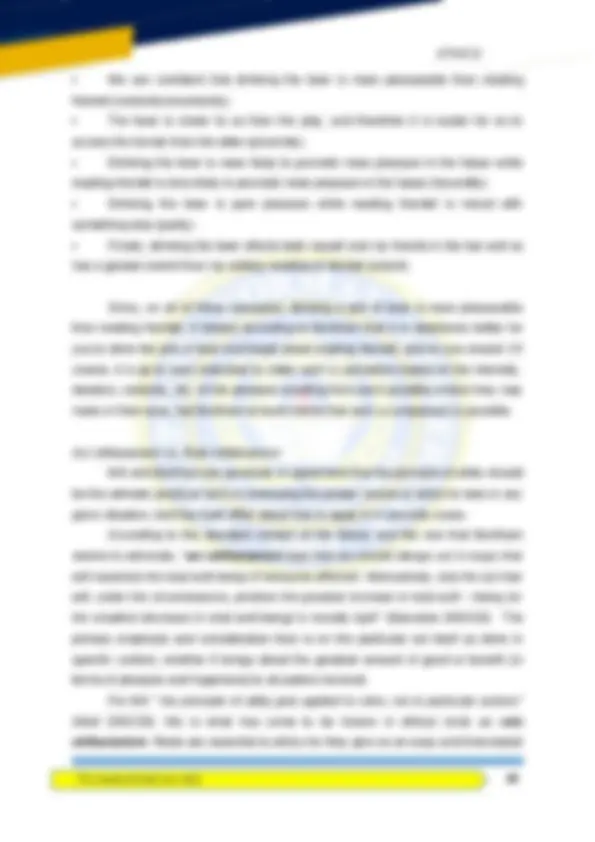
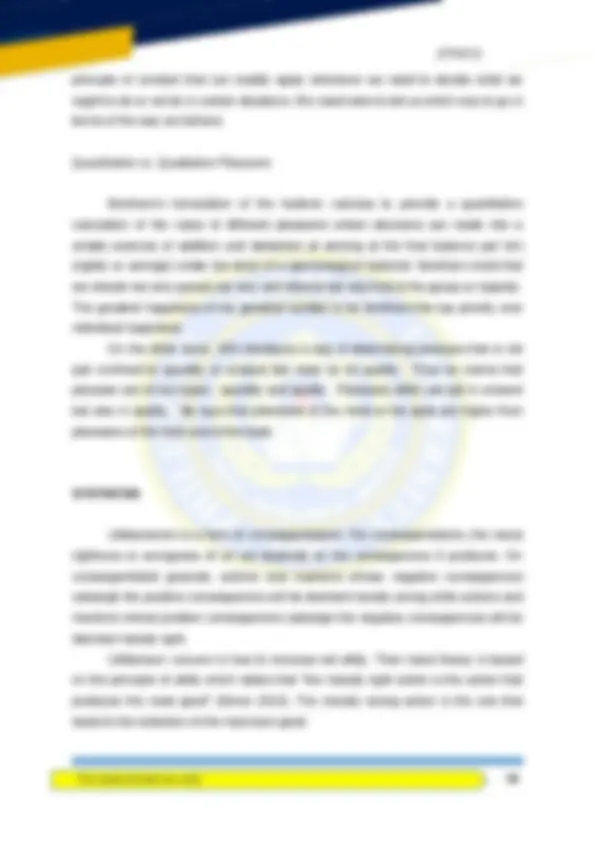
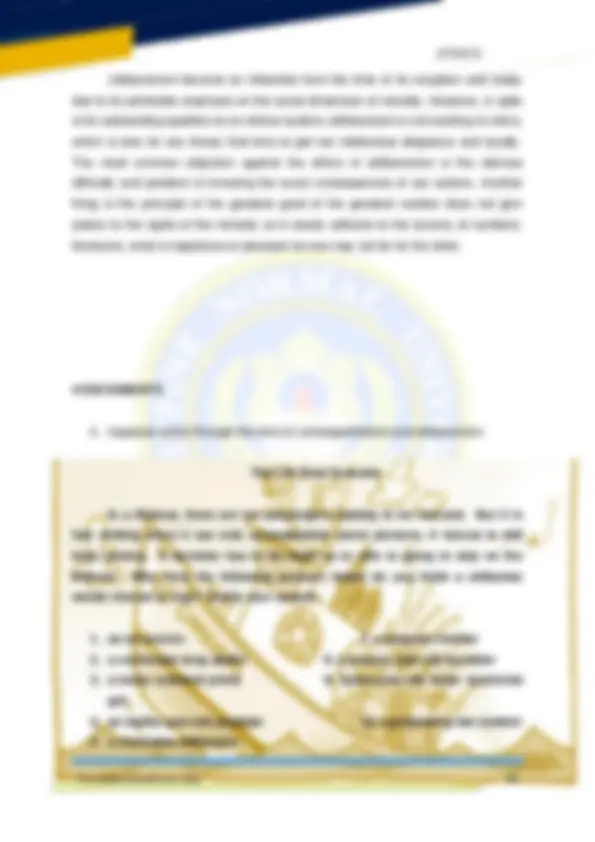
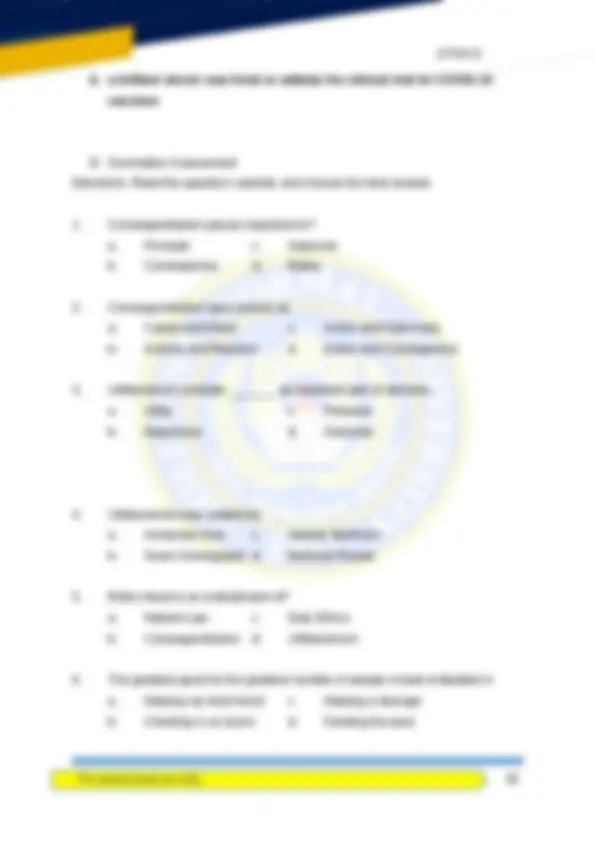
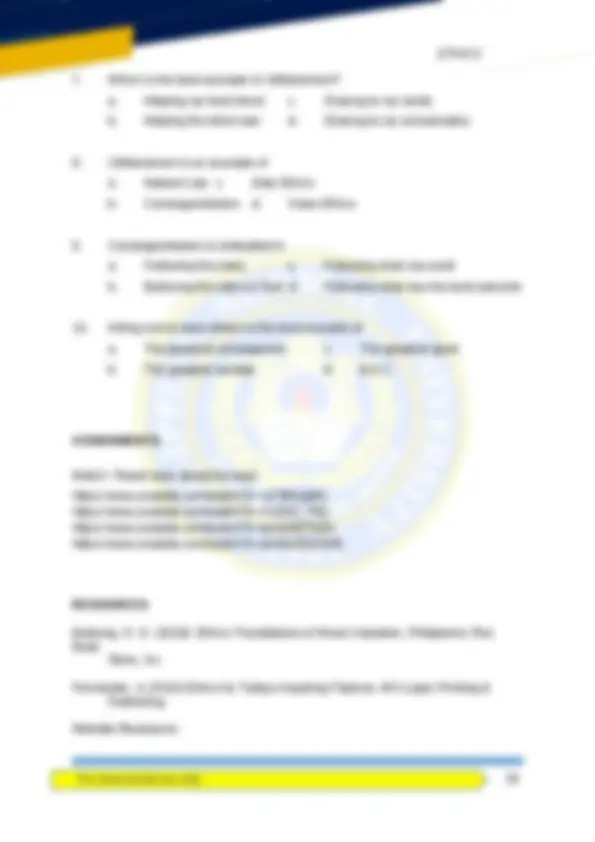
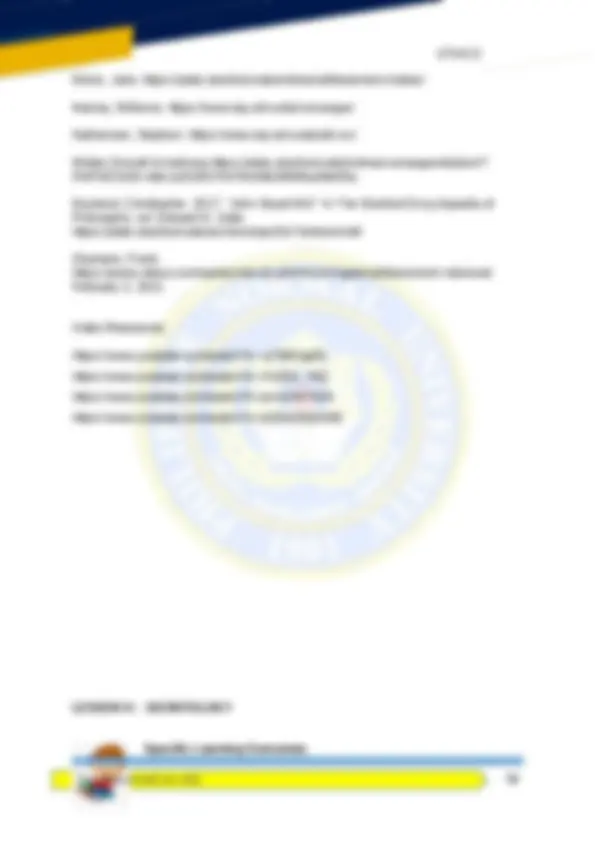
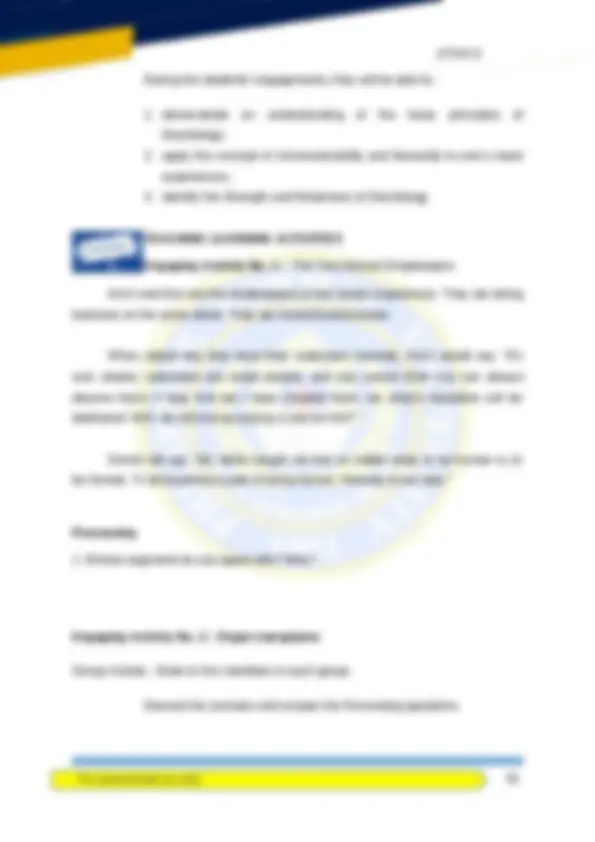
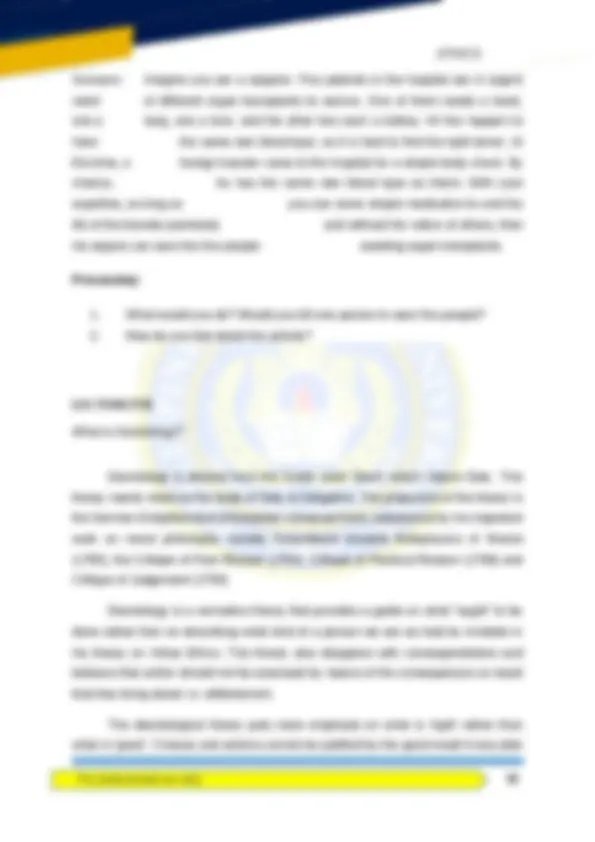
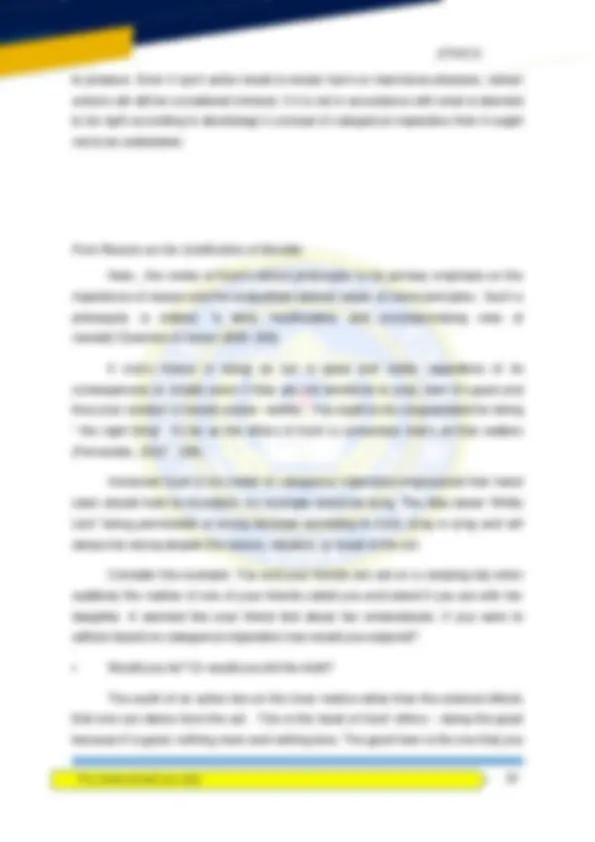
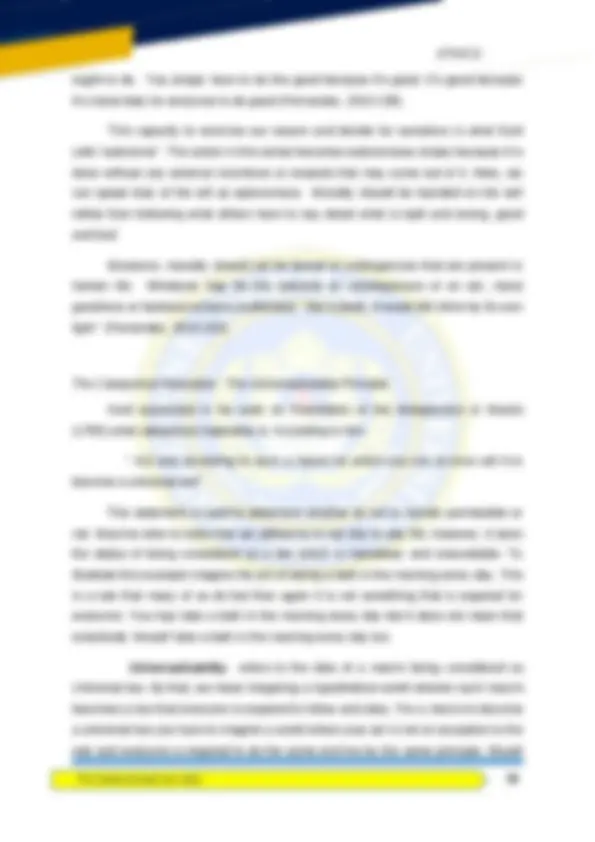
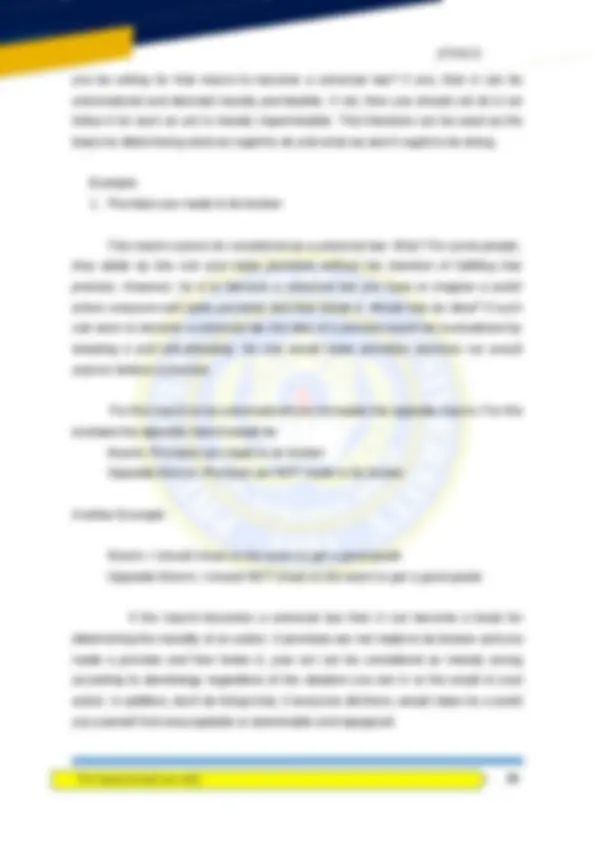
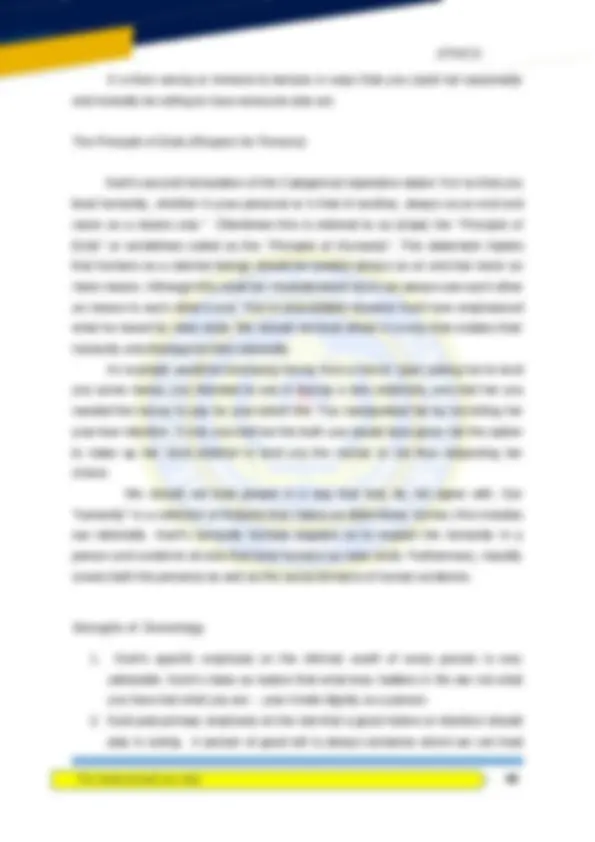
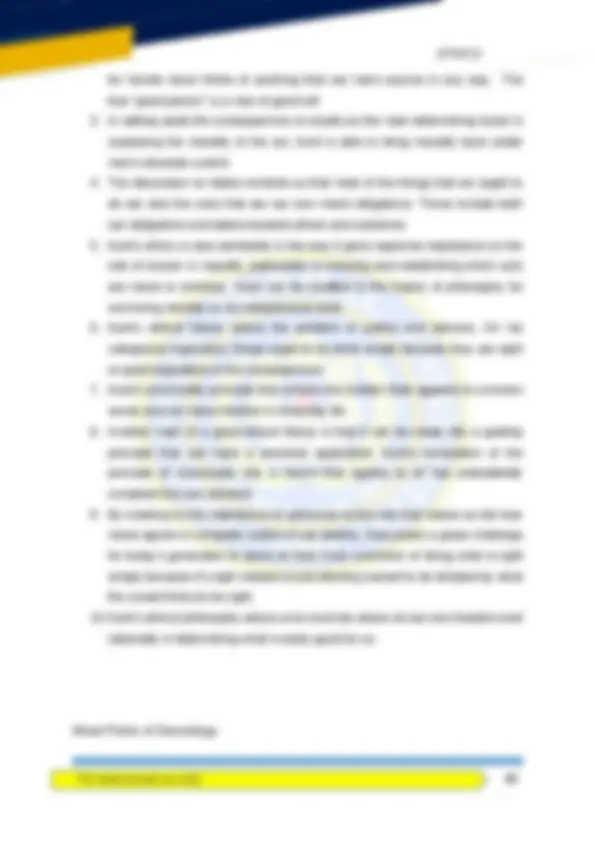
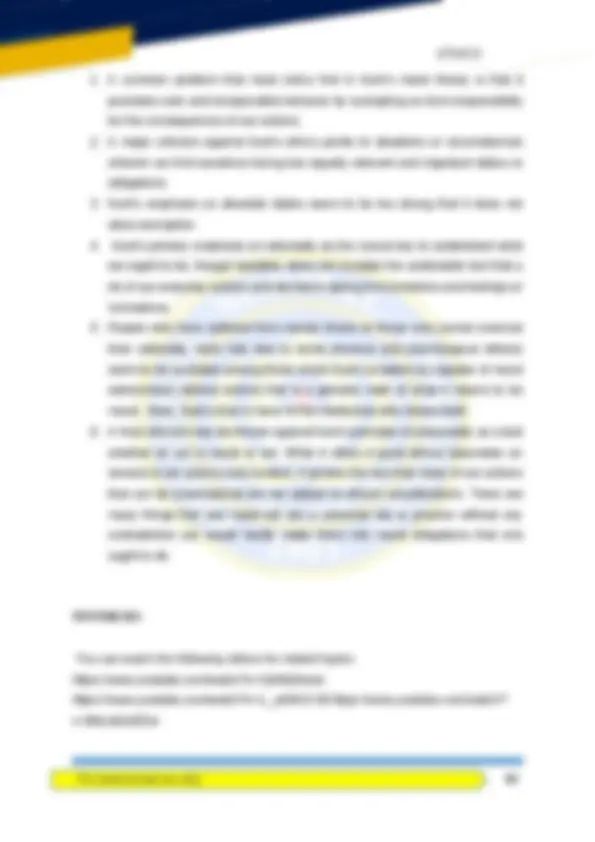
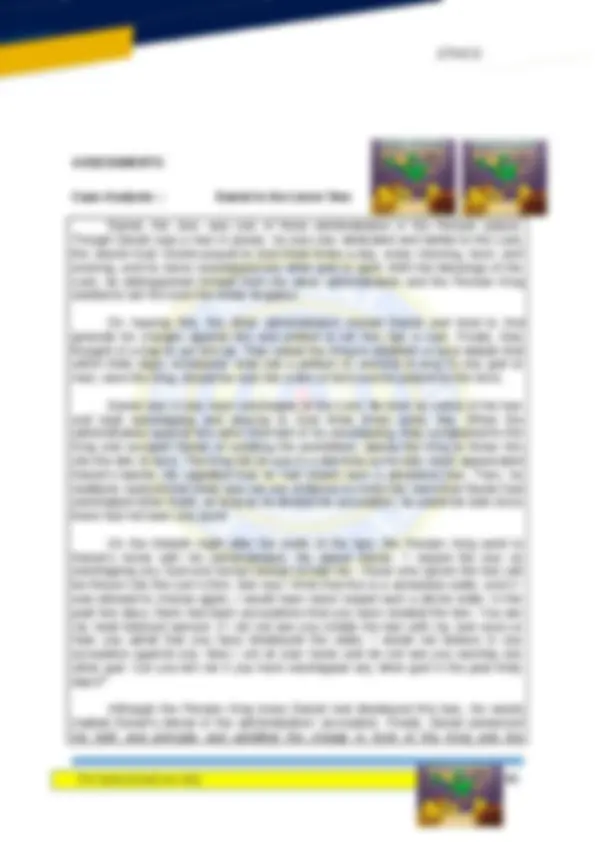
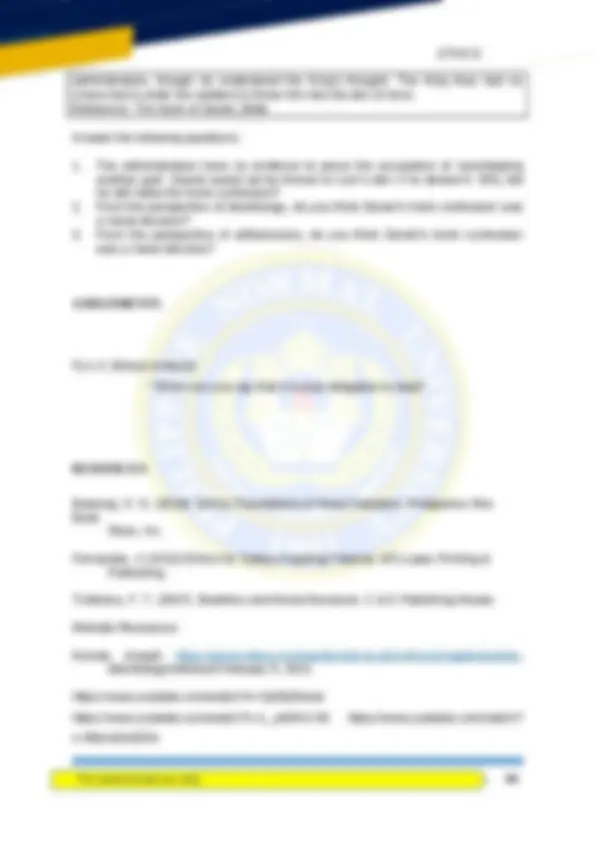
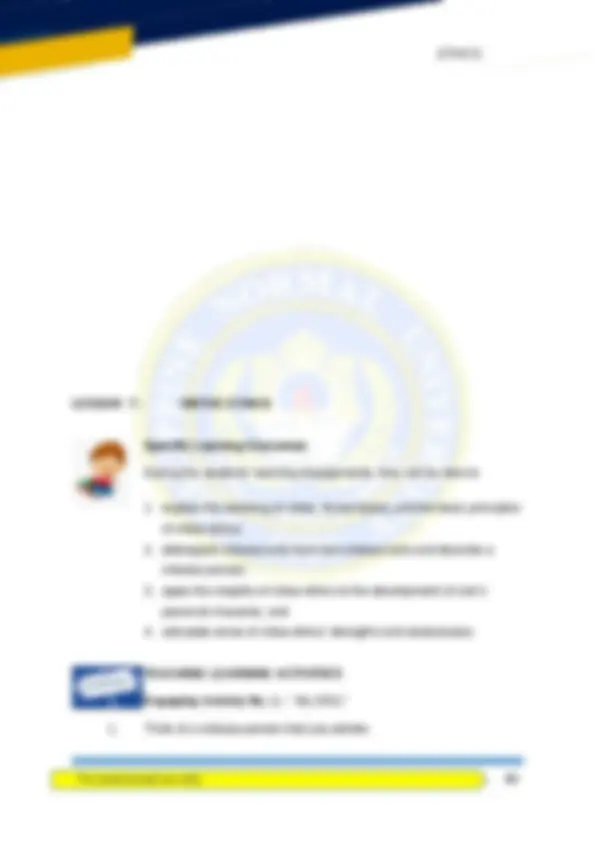
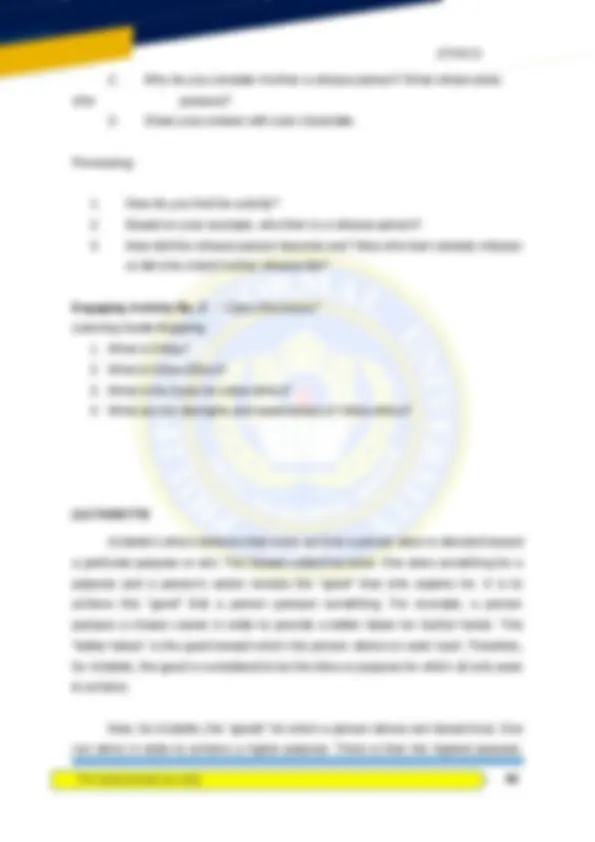
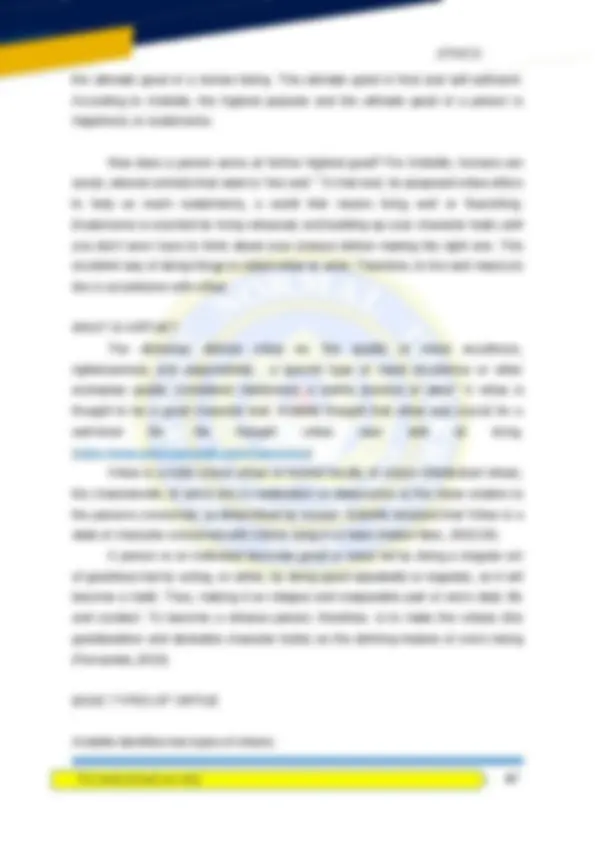
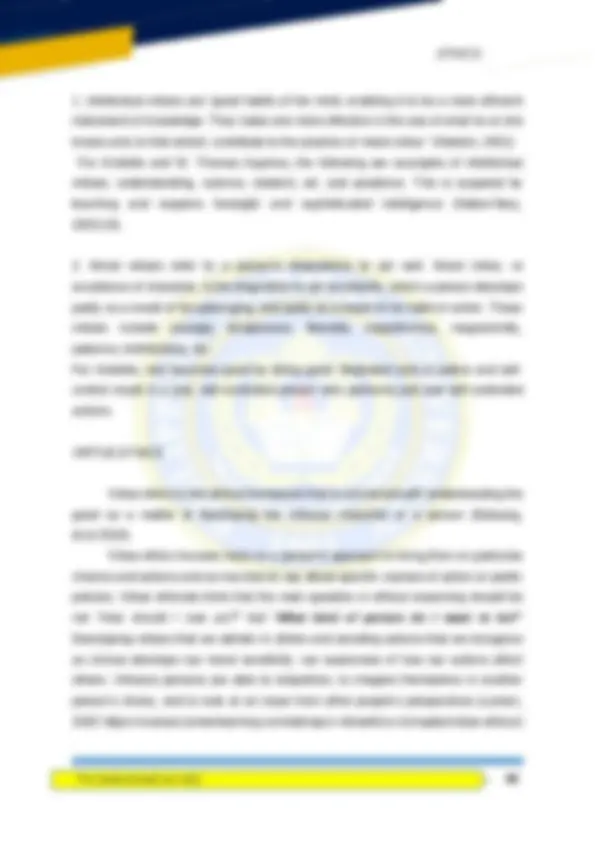
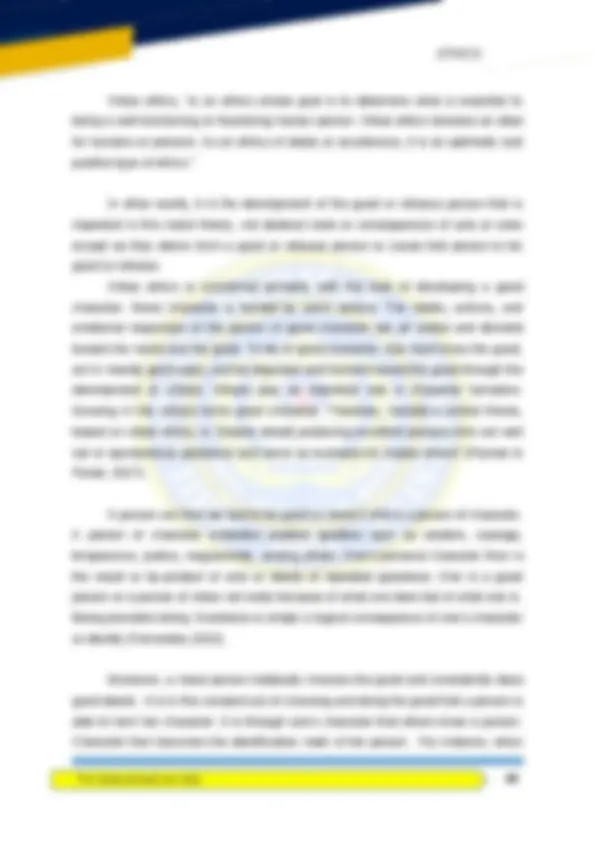
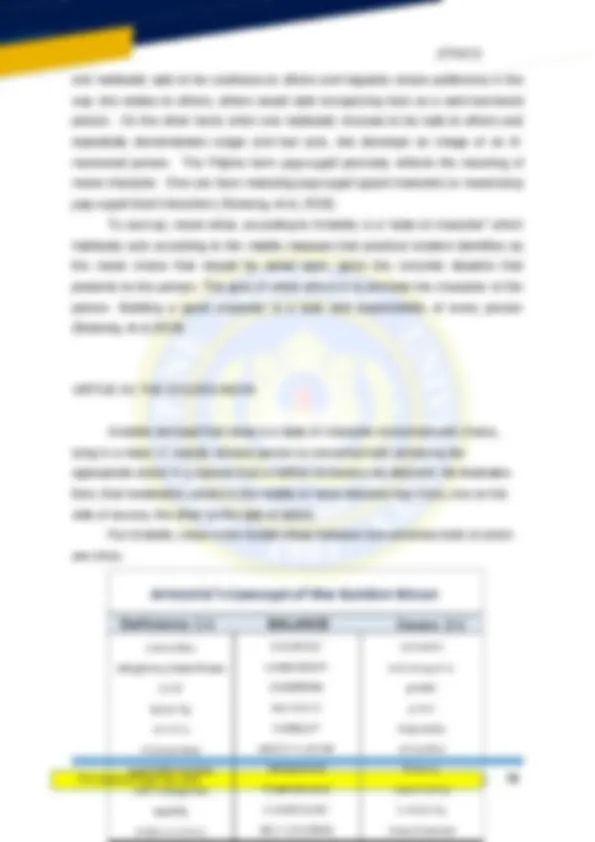
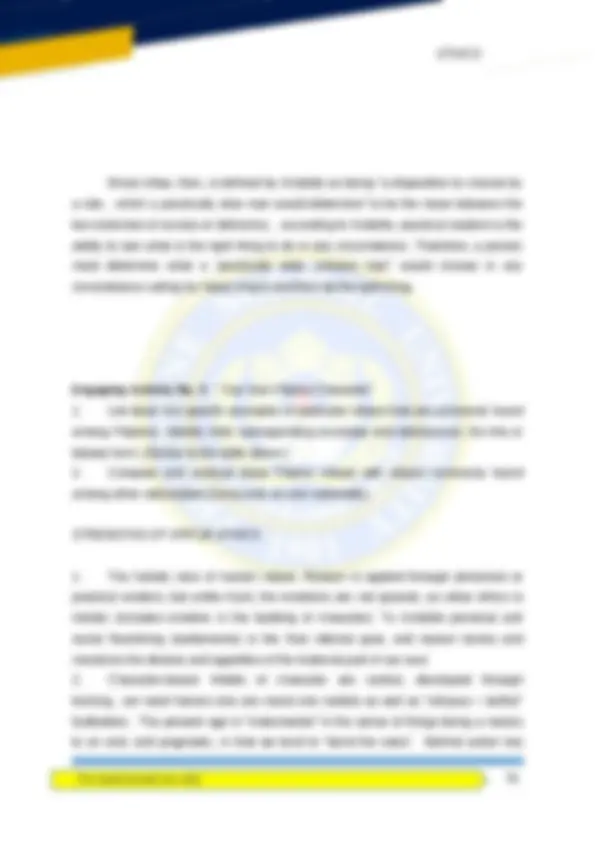
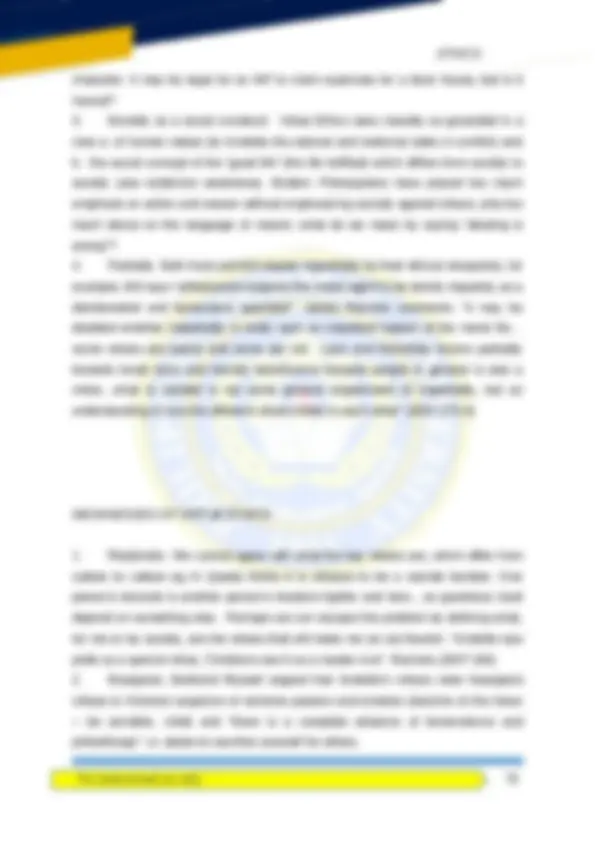
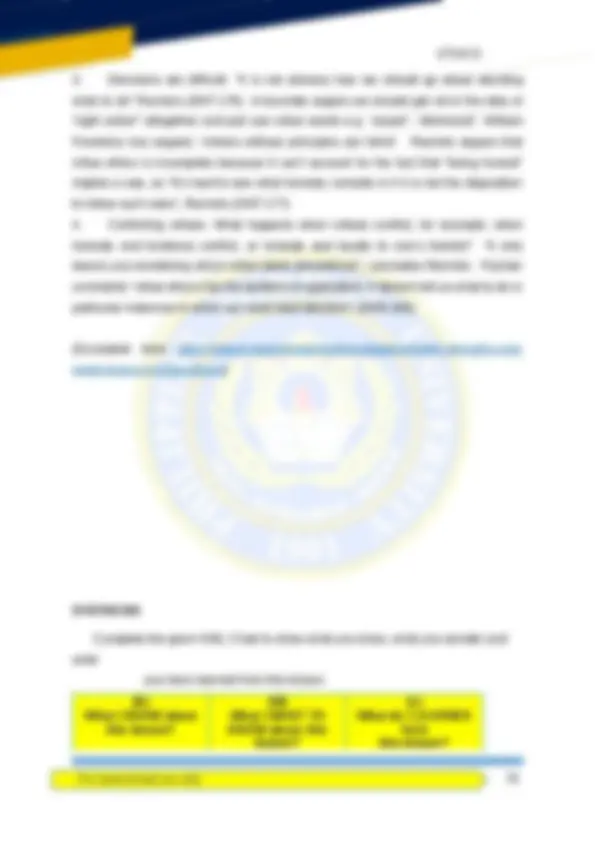
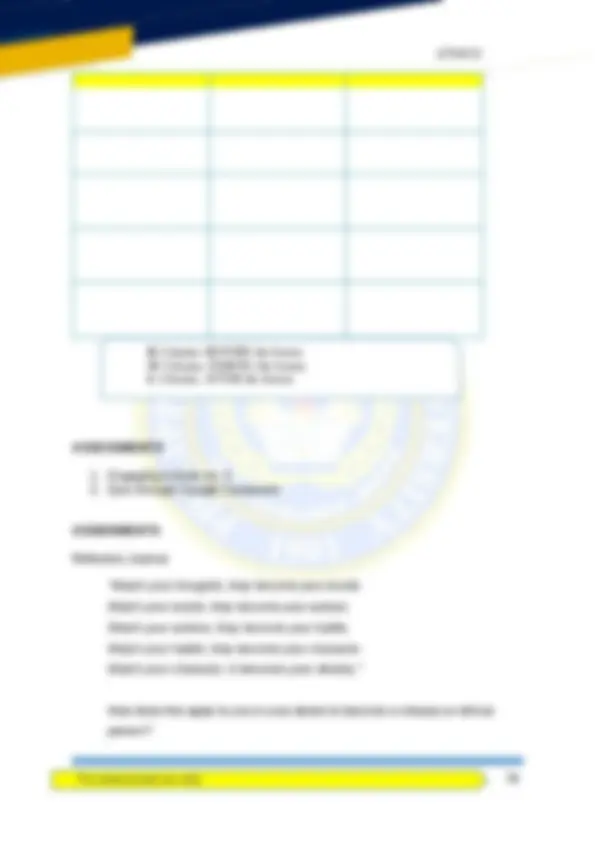
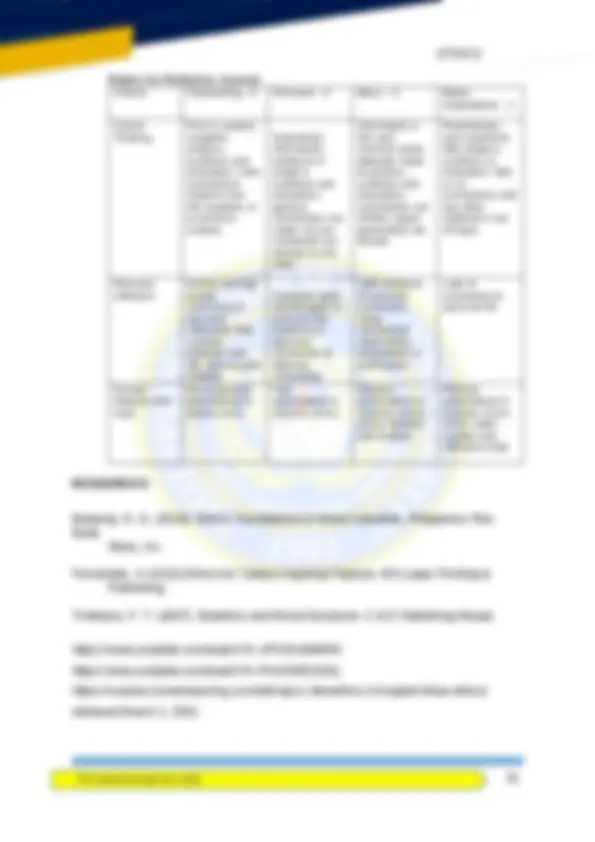
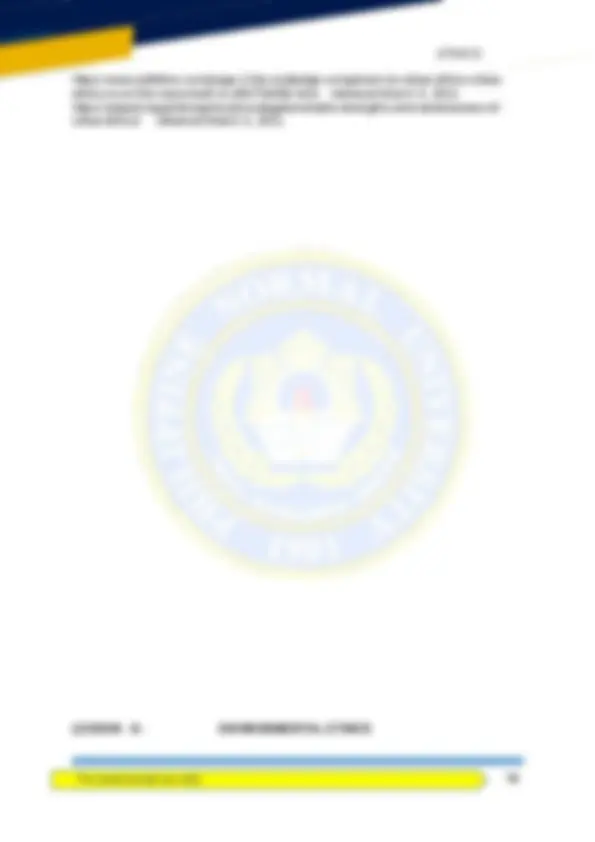
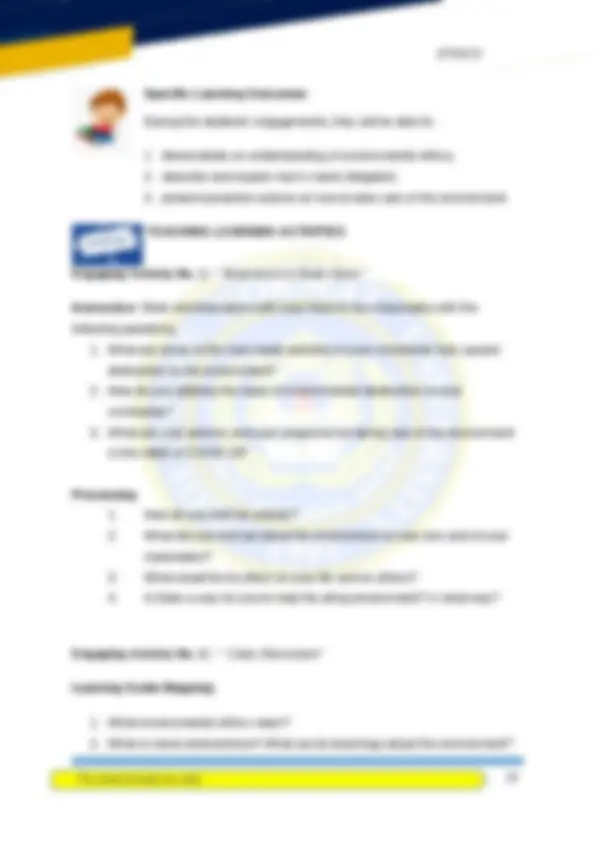
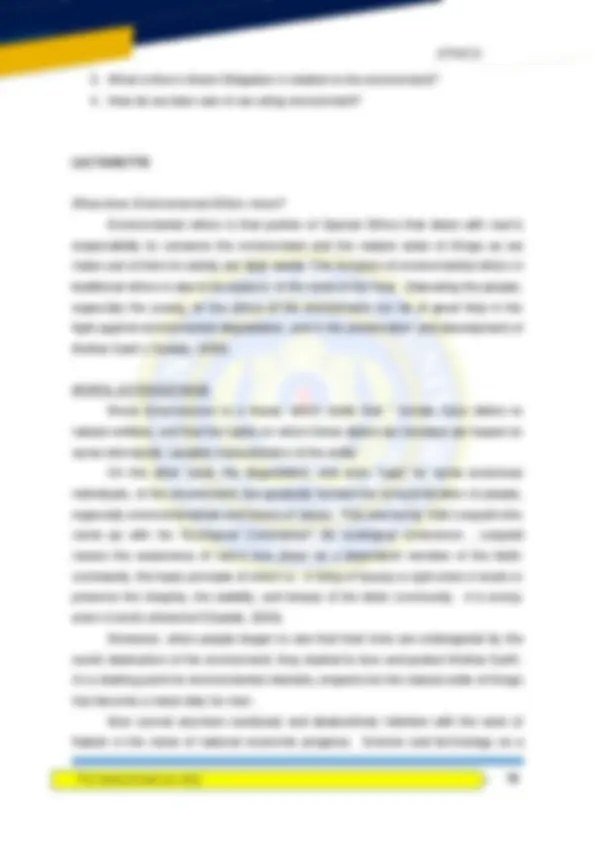
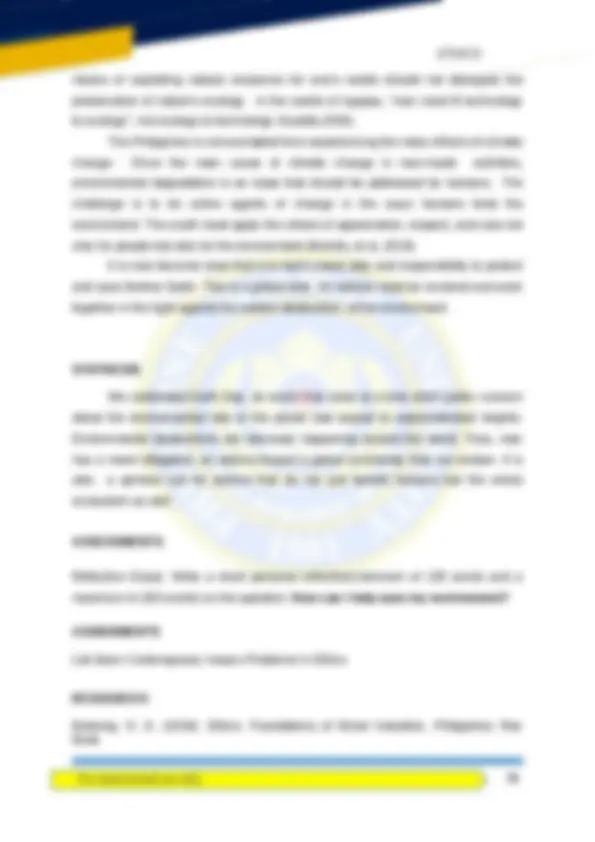
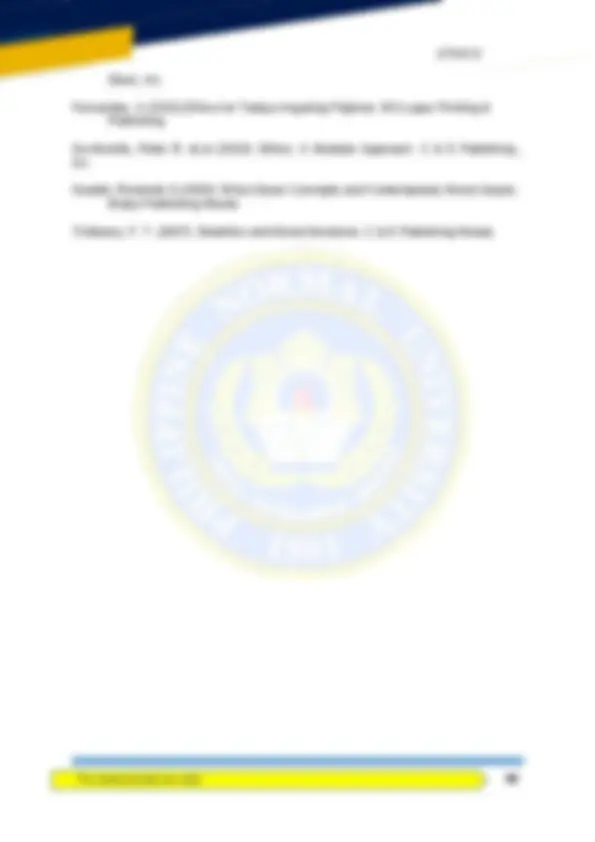


Study with the several resources on Docsity

Earn points by helping other students or get them with a premium plan


Prepare for your exams
Study with the several resources on Docsity

Earn points to download
Earn points by helping other students or get them with a premium plan
Community
Ask the community for help and clear up your study doubts
Discover the best universities in your country according to Docsity users
Free resources
Download our free guides on studying techniques, anxiety management strategies, and thesis advice from Docsity tutors
modular for first year students
Typology: Schemes and Mind Maps
1 / 80

This page cannot be seen from the preview
Don't miss anything!









































































LESSON 1 : Ethics: Its Meaning, Nature, and Scope Specific Learning Outcomes: During the students’ engagements, they will be able to:
Processing Questions :
Is the term morality synonymous with the word ethics? The answer is yes in terms of etymological meaning. But there remains a shade of difference, however. Ethics deals more on the principles and laws on the morality of human acts; it provides the person with the knowledge that he may know what to do and how to do it. In other words, ethics provides the guides to the performance of an act. Knowledge, however, is not always performed. Knowledge could remain knowledge without its translation into action. Knowing is different from doing. Man does not necessarily do what he knows. The implementation of ethical principles and laws is called morality. One who acts in accordance with ethical norms is called a morally good person. Morality is the practice of ethics (Gualdo, 2000). Relations of Ethics With other Sciences: Ethical Science is particularly concerned with the study of man and the human conduct, and is, therefore, especially related to all those sciences dealing with the study of human nature and human living. There are indeed other sciences which also study human conduct, such as psychology, sociology, and education; but ethics differs from each of these in its standpoint, or in the particular aspect of human acts with which it is particularly concerned; and this is the morality of human actions.
Issue, Decision, Judgment and Dilemma It may be helpful to distinguish a situation that calls for moral valuation. It can be called MORAL ISSUE. When one is placed in a situation and confronted by the choice of what action to perform, she is called to make a MORAL DECISION. e.g. I choose not to take something I did not pay for. When a person is an observer who assesses the actions or behavior of someone, she is making a MORAL JUDGMENT. For instance, a friend of mine chooses to steal from a store, and I make a wrong assessment. Reasoning Why do we suppose that a certain way of acting right and its opposite wrong? The study of ethics is interested in questions like these: Why do we decide to consider this way of acting as acceptable while that way of acting, its opposite, is unacceptable? To put it in another way, what reasons do we give to decide or to judge that a certain way of acting is either right or wrong? Asking the question “WHY” might bring us to no more than a superficial discussion of rewards and punishments, but it could also bring us to another level of thinking. Perhaps one can rise above the particulars of a specific situation, going beyond whatever motivation or incentive is present in the instance. Beyond rewards and punishments. It is possible for our moral valuation – our decisions and judgments – to be based on a principle. Thus, one may conclude that cheating is wrong based on a sense of fair play or respect for the importance and validity of testing.
Principles – rationally established grounds by which one justifies and maintains her moral decision and judgments. Discerning Moral Dilemma Every normal, moral individual encounter a moral dilemma, whether consciously or unconsciously. The dilemma is defined as “a situation in which a difficult choice has to be made between two or more alternatives, especially equally undesirable ones” (Dictionary.com @2017). A typical moral example of this is a mother who has an ectopic pregnancy. She has to decide between two equally undesirable options; whether to abort the child and save her life or let the baby born and endanger/sacrifice her life. If you face a problem “but the solutions available to you will only create another problem or worse create more problems, then you are in a dilemma” (Gallinero, p. 9). Gallinero continued: A moral dilemma is a situation where: 1.) There are two or more actions that you can do. 2.) There is a moral reason(s) for doing such actions. 3.) You cannot do all the possible actions presented to you. You only need to choose one. Moral dilemma is a moral conflict, where the decision must be made between two or more equipollent obligations viz. in cases of broad equivalence of the forces of moral duties involved, which conflict with each other and cannot be met at the same time, in situations that are often hard to assess and are or may be accompanied with emotional burden (e.g. Heinz's dilemma). Example : Heinz’s dilemma. This is a conflict case or dilemma story that was used by Lawrence Kohlberg to determine the stages of moral development. The story has several variations, one of them goes like this. Heinz’s wife is dying from a particular type of cancer. Doctors say that a newly developed drug might save her life. The drug had been discovered by a local chemist and Heinz tried desperately to buy some, but the chemist was charging ten times the money it cost to make the drug
The importance of the study of ethics follows immediately from the importance of ethics itself. Ethics means right living and good moral character, and it is in good moral character that man finds his true worth and perfection. All the great teachers of the ages maintain that the supreme purpose of human living lies not in the acquisition of material goods or bodily pleasures, nor the attainment of bodily perfections such as health and strength; nor even in the development of intellectual skills but in the development of the moral qualities which lift man far above the brute creation. According to Socrates, “the unexamined life is not worth living for man.” Now ethics, as we already said before, is the very investigation of the meaning of life. That is why Plato calls and considers ethics the supreme science, the science par excellence, as it is this science that deals with the Summum Bonum, the supreme purpose of human living. ASSESSMENTS
1. The output of the Engaging Activity No. 1 2. Misconception Check: (learning from the video clip in Engaging Activity No. 2 Pre -learned New Learning ASSIGNMENTS A. Reflective Learning : Make a reflection on “ My Personal Values and Ethics” (FLA # 1) Rubrics for Reflective Learning (Reflection) Criteria Strong (3 ) Average ( 2 ) Weak (1) Total Content Reflections reveals strong insights about Reflections shows some insights about Reflections shows little insights about
LESSON 2 : Natural Law Ethics Specific Learning Outcomes : During the students’ engagements, they will be able to:
Processing
has forfeited his or her innocence (and his/her right to life) by threatening yours” (Harris 1997:104). The Just War Theory A related principle and application of the principle of forfeiture is in the so-called Just War theory. The principle of forfeiture can be used not only to justify an act of individual self-defense but also in the case of defending a whole country from an unjust aggressor (foreign invader). Just War theory employed by a country under attack to protect itself is only justified under specific conditions; a. Lawful Authority b. Just Cause c. Last Resort d. Good Intention e. Reasonable Chance of Success f. Right Use of Means g. Proportional Response D. The Principle of Totality A traditional element in biomedical discussions, the principle of totality, is often Invoked when a particular part or organ of the human body has to be cut off, mutilated or removed. A person is morally permitted to do this, " only insofar as the general well-being of the whole body requires it “ (Timbreza 1993:57). On this regard, therefore, we can say that the principle of totality considers as immoral the mutilation or removal of healthy organs for commercial purposes. E_. The Principle of Stewardship_ The principle of stewardship has its basis on the religious belief that all life comes from God, the supreme creator and maker of all. It is therefore morally wrong to commit actions such as suicide and euthanasia since stewardship entails proper protection and responsible care of what the Almighty has given.
The principle of stewardship also finds concrete and practical application on issues concerning the natural environment. The earth and everything in nature as a gift from God, has to be taken cared of and should not be abused in any way. Ethics and Religion: Religion from the Latin word re-ligare or “to bind back”; religio or religion implies “bond”, a relationship between man and God. Religion determines its true value from the role it plays in the enrichment of the quality of life. It has a role to play, a contributive role in the evolution of man, by providing society with ethical codes, social rules and ideals, rituals and devotion. Religion also enhances human values and self-awareness. According to some, religion is necessary for moral behavior. Without religion or some kind of belief in a supernatural being or a divine reality, it would be impossible to lead a good life or even pursue anything of moral value. This particular belief and philosophy that grounds morality and the good life to religion is known in the realm of ethical thought as the Divine Command Theory (Fernandez, 2010). Divine Command Theory claims that whatever God permits/ commands and prohibits/forbids is what makes certain actions right or wrong. God then becomes the ultimate source of morality. Christian Ethics What is the ethical ultimate goal of Christianity? It is two-faced: GOD’S GLORY and SALVATION OF MANKIND. There are two basic points in Christian ethics:
1. God promises salvation to man, and 2. Man freely accepts the condition for his salvation: to do or not to do God’s will (the commandments). SYNTHESIS
The Mother or the Fetus: Who Should be Saved? A woman in her early twenties is a two-month’s pregnant with her first baby. She is diagnosed with uterine cancer. If her uterine is removed, chances are, she will live but the operation also endangers the life of the fetus. Her doctors told her that she has to undergo the said operation as soon as possible to save her life. The woman wants her baby to live but her husband disagrees with her. Should the operation be done? Is it morally permissible under the principle of double effect? Why or why not?
Publishing. Nabor-Nery M. (2003) Ethics. KATHA Publishing Co.,Inc.388 Quezon Avenue, Quezon City. Pasco, M. O. et. al., (2018): Ethics, Quezon City, Philippines: C & E Publishing, Inc. https://www.ethicssage.com/2012/09/the-role-of-ethics-in-religion.html retrieved Jan. 12, 2020. LESSON 3 : Ethical and Cultural/Moral Relativism Specific Learning Outcomes: During the students’ engagements, they will be able to:
Processing